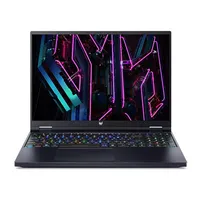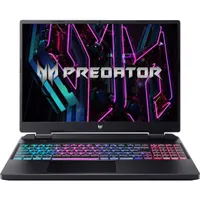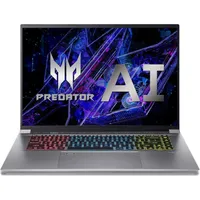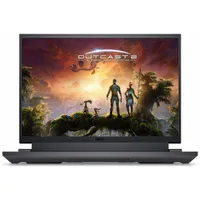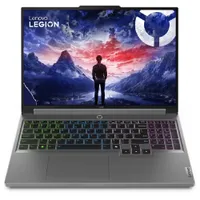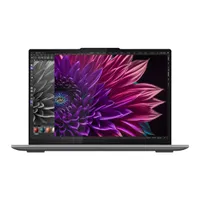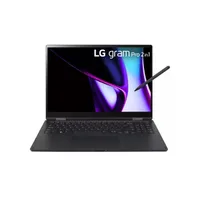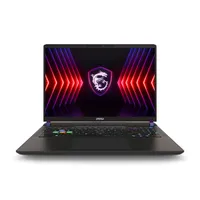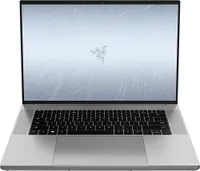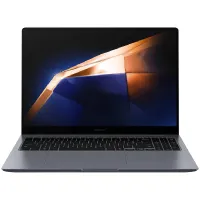Best 16-inch laptops in 2025: 7 top picks I recommend based on testing and reviews
Check out the best 16-inch laptops for every budget and use case
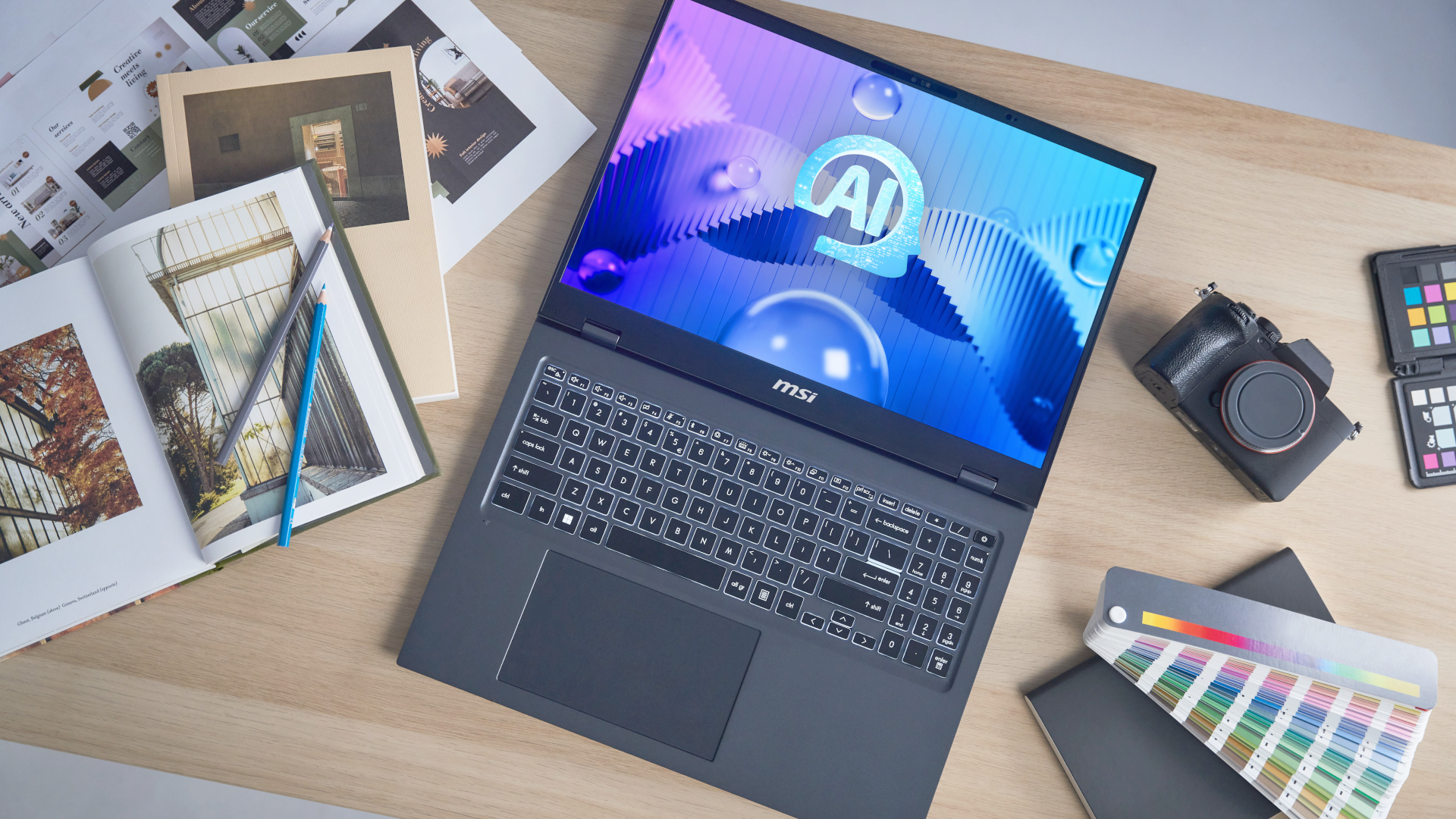
1. The list in brief
2. Best overall
3. Best budget laptop
4. Best premium laptop
5. Best gaming laptop
6. Best 2-in-1 laptop
7. Best for creators
8. Best Ultrabook
9. Recently reviewed
10. Benchmark comparisons
11. How to choose
12. FAQs
13. How we test
14. Why trust Laptop Mag
If you need a thin and light laptop with a large display, the best 16-inch laptops will let you have your cake and eat it, too. They're just as portable yet provide more working space. The days of jamming a brick-like laptop into our bag are well behind us!
As processors have become more power-efficient, laptops have slimmed down. They're much more likely to be around a half-inch thick and weigh 4 pounds or less. Some 16-inch laptops have even gained more battery life as a result.
If you game a lot, edit videos, render animations, draw, or your eyesight isn't what it used to be, a 16-inch laptop could be the best choice. You can magnify text without pushing too much of it off-screen (and won't have to scroll as much).
My top pick for the best 16-inch laptop currently is the MSI Prestige 16 AI Evo, which offers solid performance, battery life, and a gorgeous OLED display. MacOS fans should choose the 16-inch MacBook Pro M4 Pro, our longest-lasting MacBook ever, with class-leading performance. On a budget? The Acer Swift Go 16 is a stellar choice for under $800. Those are just a few of my recommendations; read on for the rest.
This page is constantly updated based on our latest reviews to reflect Laptop Mag's current picks for the best 16-inch laptops in 2025.
May 20, 2025: We've swapped out our top pick for the best 16-inch gaming laptop, which is now the HP Omen Max 16
Quick List
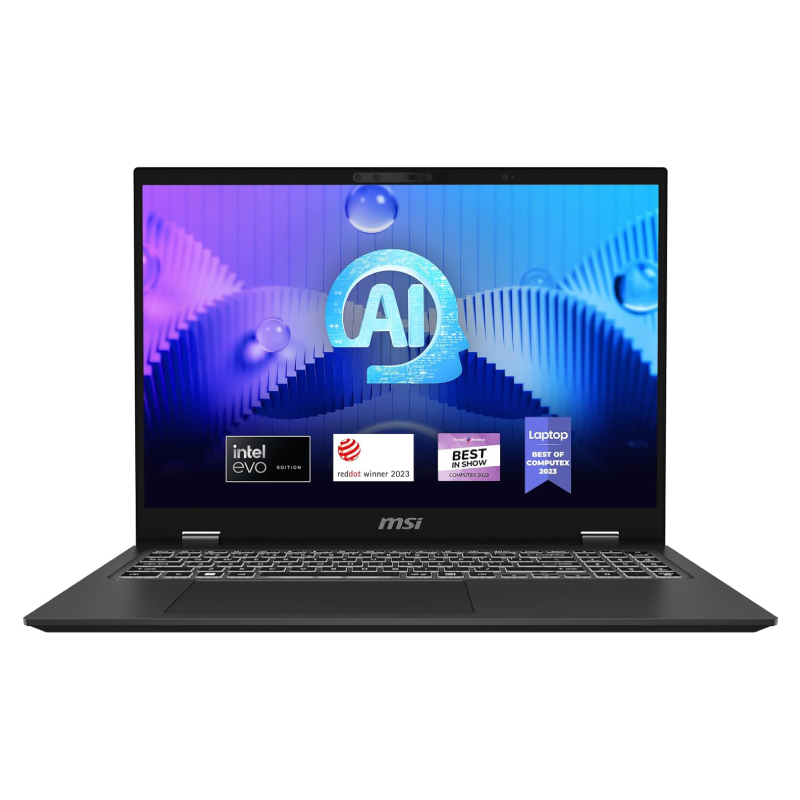
Best overall
MSI's Prestige 16 AI Evo is an all-around powerhouse. Configured with an Intel Core Ultra 7 155H, 32GB of RAM, a 1TB SSD, and a 16-inch OLED display, it has the specs to handle nearly any task — and it survives a full day on battery power without a drop in performance.
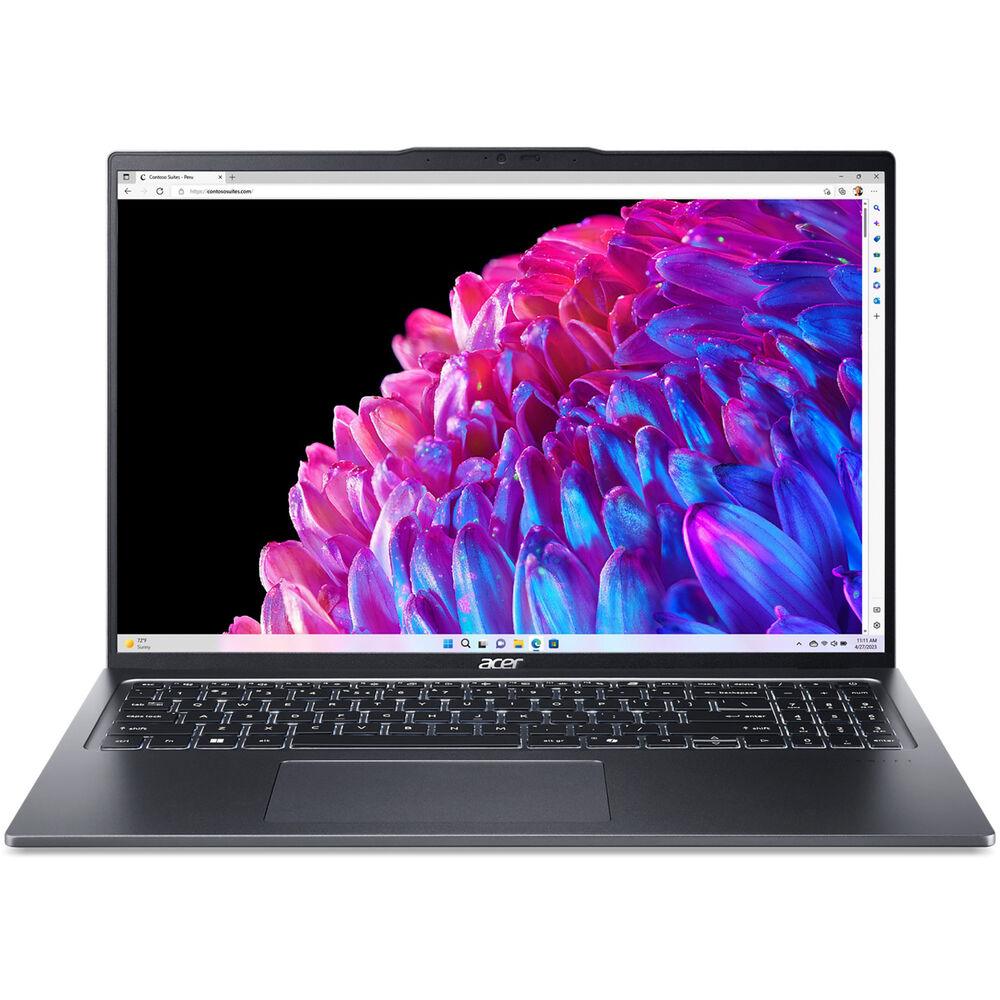
Best budget laptop
This productivity laptop boasts some serious performance, as well as more than 10 hours of battery life and a colorful IPS display. It's also one of the lightest and thinnest laptops we've tested — all at a price that seems too good to be true.
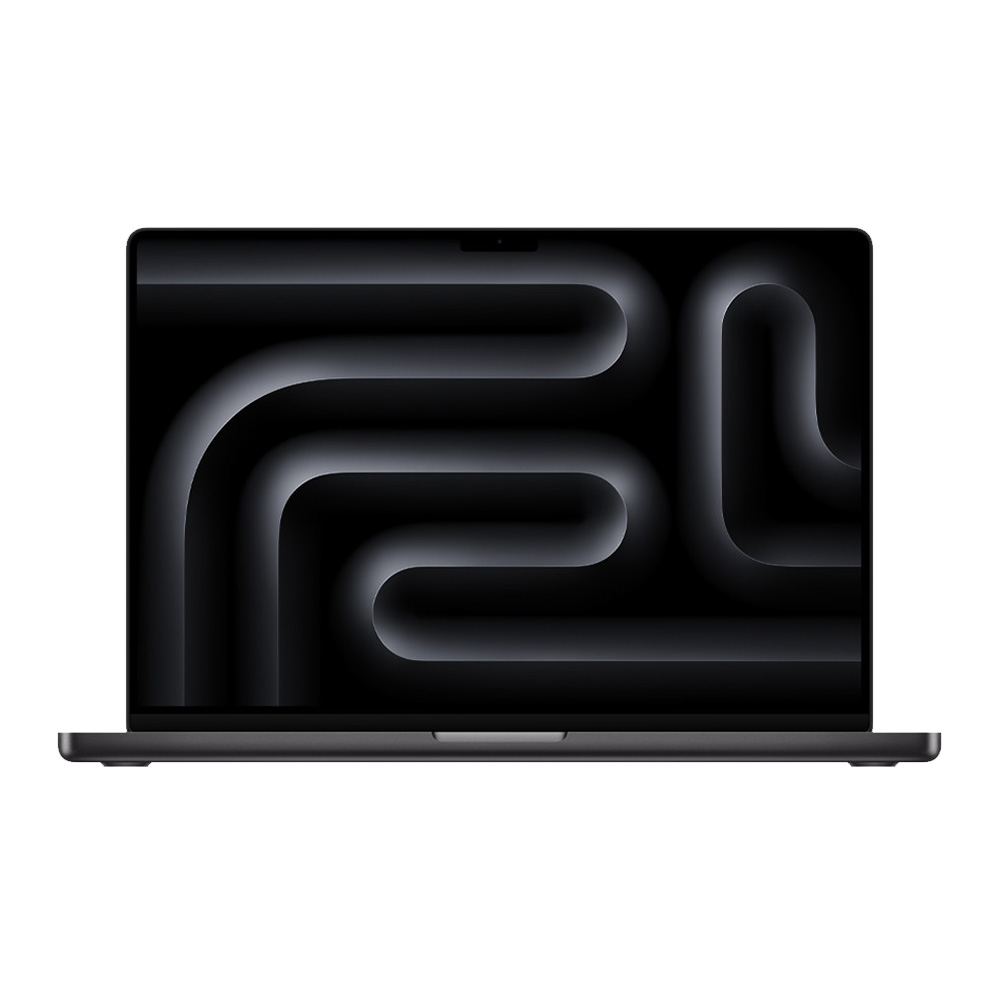
Best premium laptop
The Apple MacBook Pro 16 M4 Pro it's one of the best Laptop Mag has ever tested: nearly 21 hours of battery life, phenomenal performance, and display and speakers that put on a sensory showcase. This laptop puts the high in high-end.
Read more below
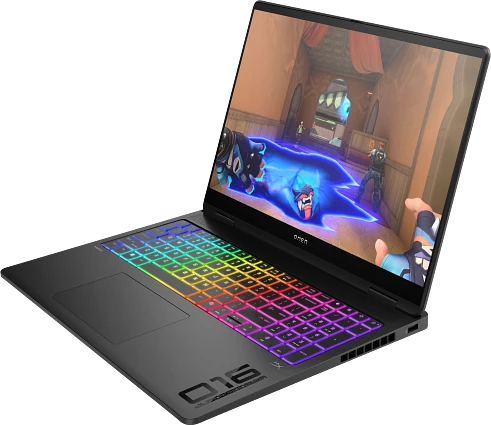
Best gaming laptop
The HP Omen Max 16 delivers so much good with its intense Nvidia RTX 5090 GPU and gorgeous OLED display.
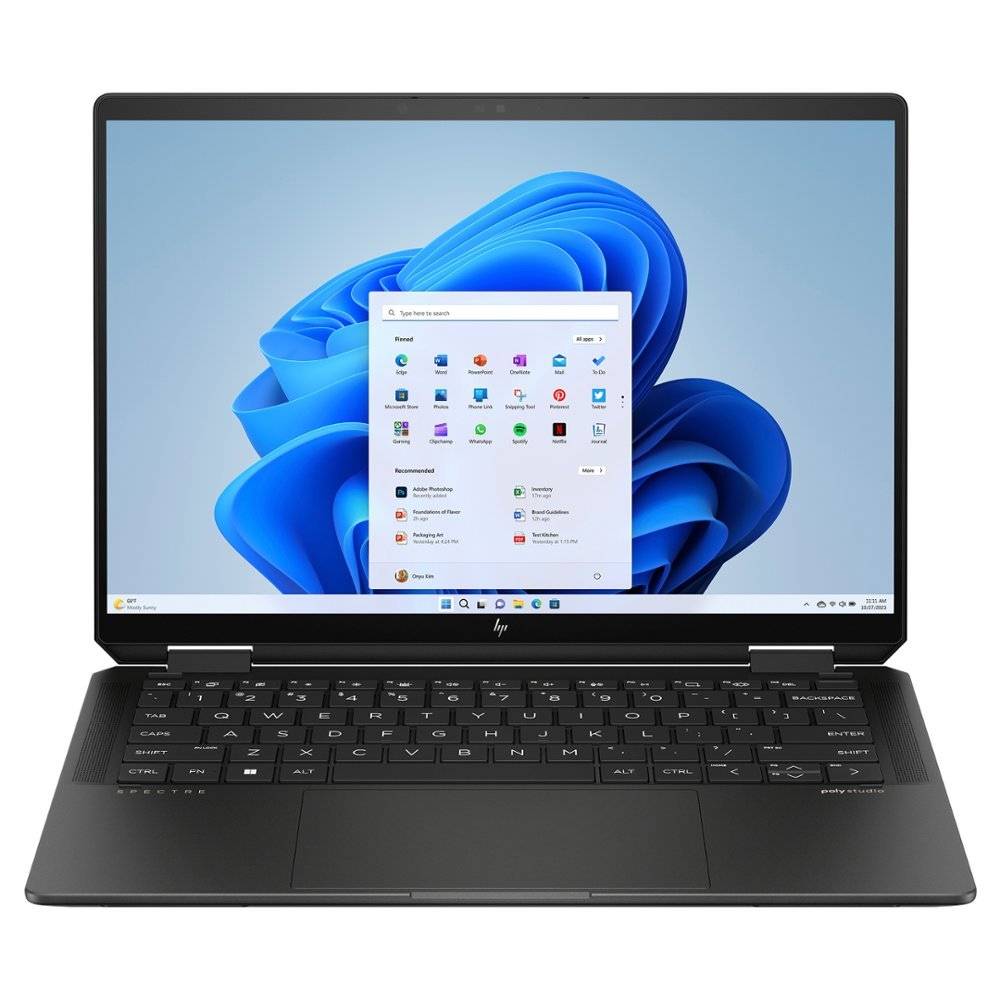
Best 2-in-1 laptop
Our favorite 2-in-1 laptop has a larger 16-inch sibling that's just as phenomenal: the HP Spectre x360 16. It's performance, vibrant OLED display, fantastic speakers, great battery life make it a fantastic, versatile machine for almost any task.
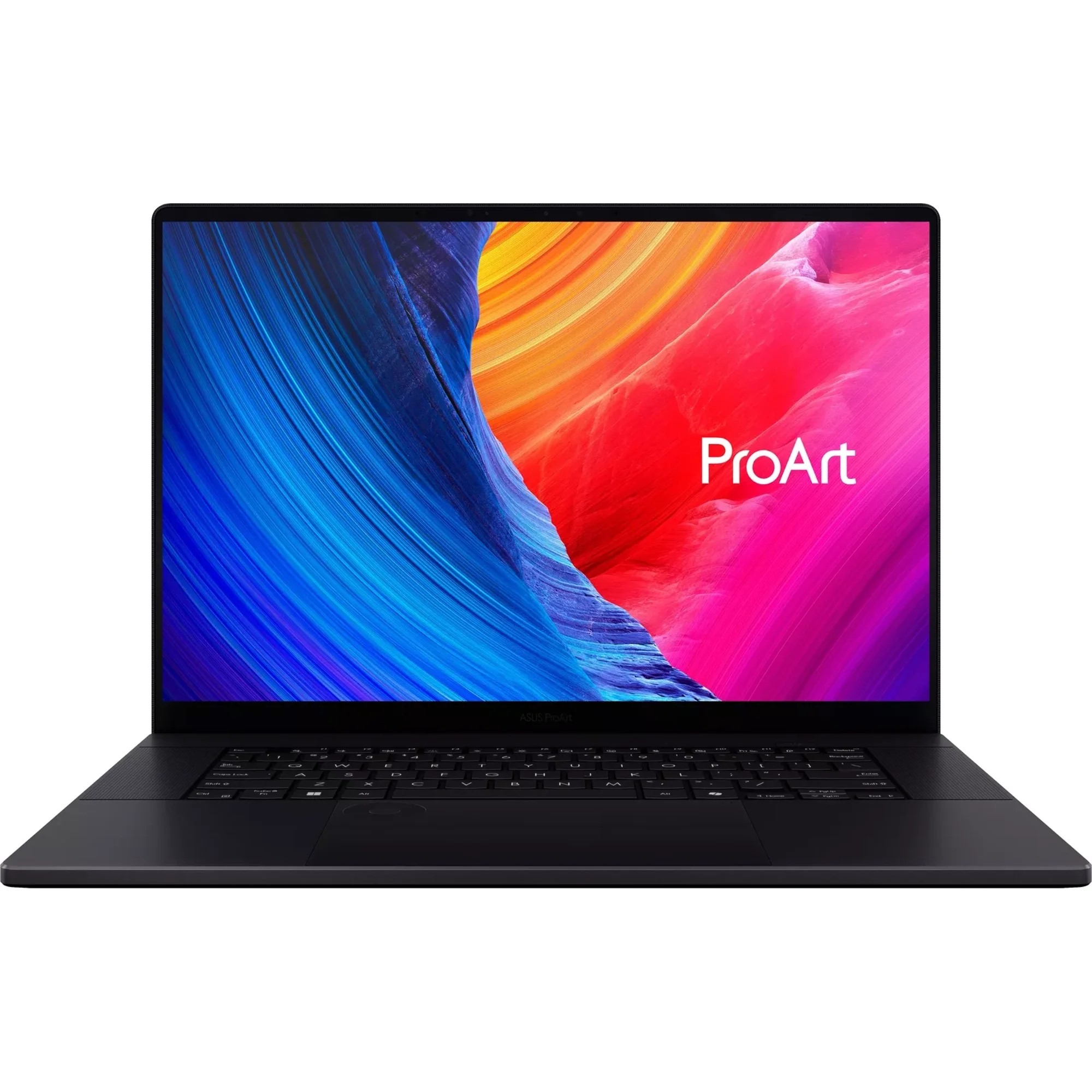
Best for creators
If you need performance, a great display, and good battery life at a sub-MacBook Pro price, this touchscreen laptop has a nice balance of all three. It's powered by a new AMD Ryzen AI 9 HX 370 processor, a Nvidia RTX 4070, and is loaded with RAM and storage space.
Click to view final recommendation
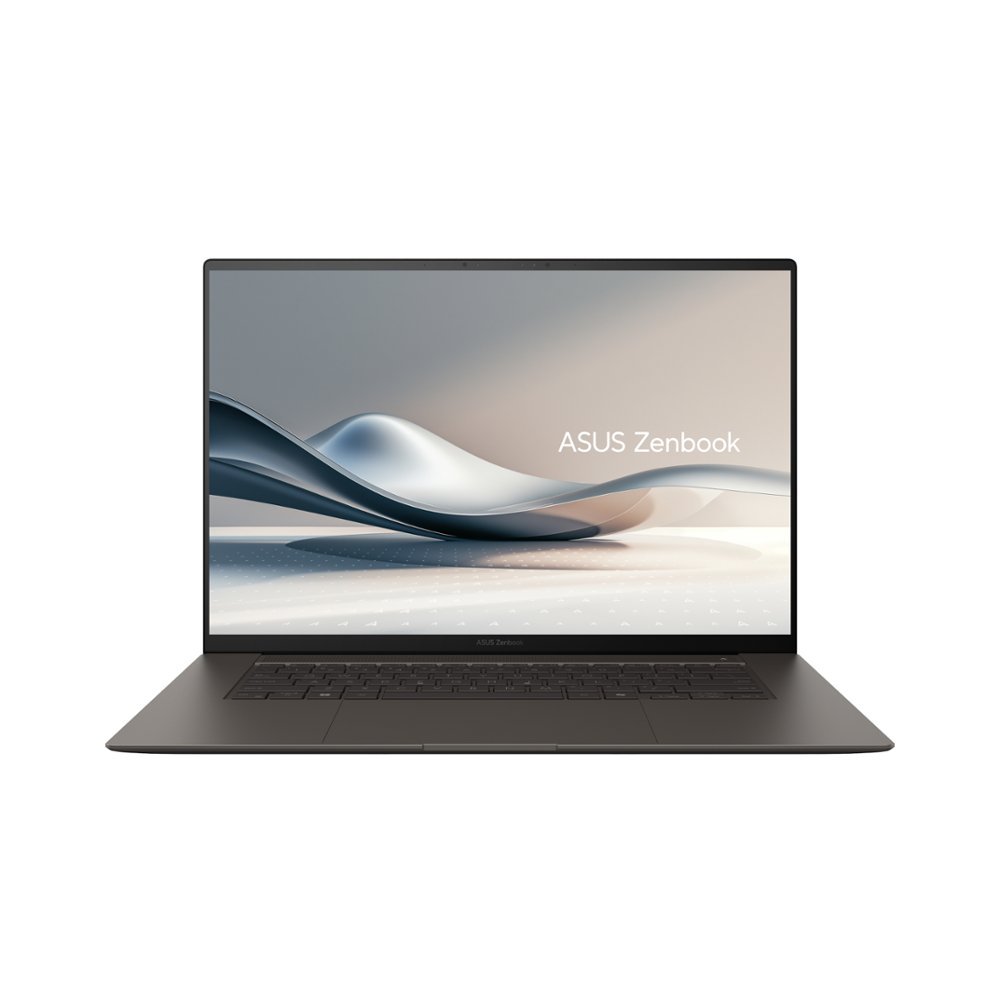
Best Ultrabook
For a laptop with a 16-inch display, the Zenbook S16 is remarkably thin and light. Its AMD Ryzen AI 9 has more processing power than the MacBook Air M3, and its integrated Radeon 890M graphics have a surprising amount of performance — so much you can actually game on this laptop without a separate graphics card.

Joanna Nelius has reviewed laptops and computer hardware since 2018. Her work has appeared in The Verge, USA Today, Gizmodo, PC Gamer, and Maximum PC. She holds an MFA from Chapman University and works as a creative writing instructor.
The best 16-inch laptops in 2025
Why you can trust Laptop Mag
Best overall
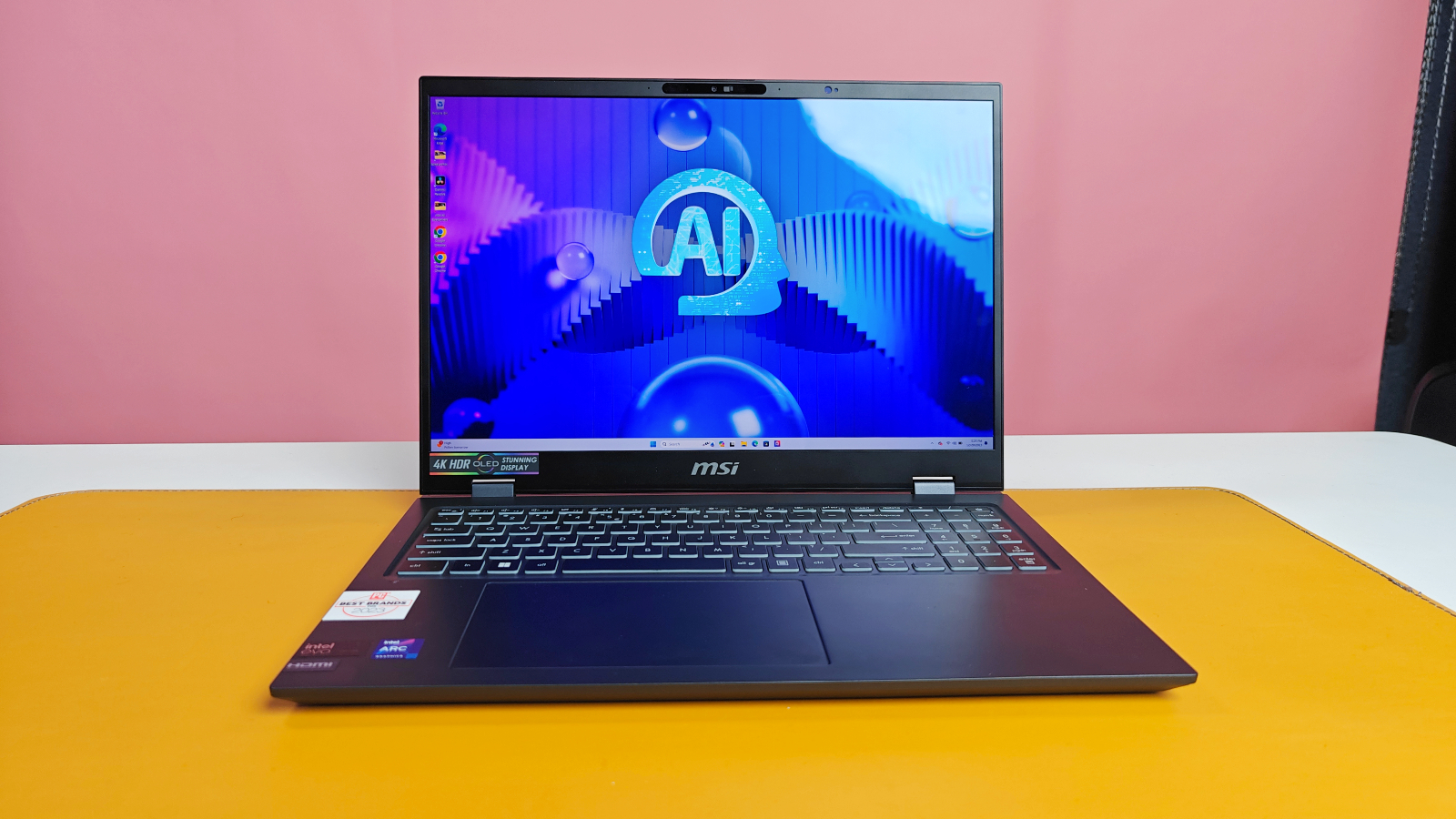
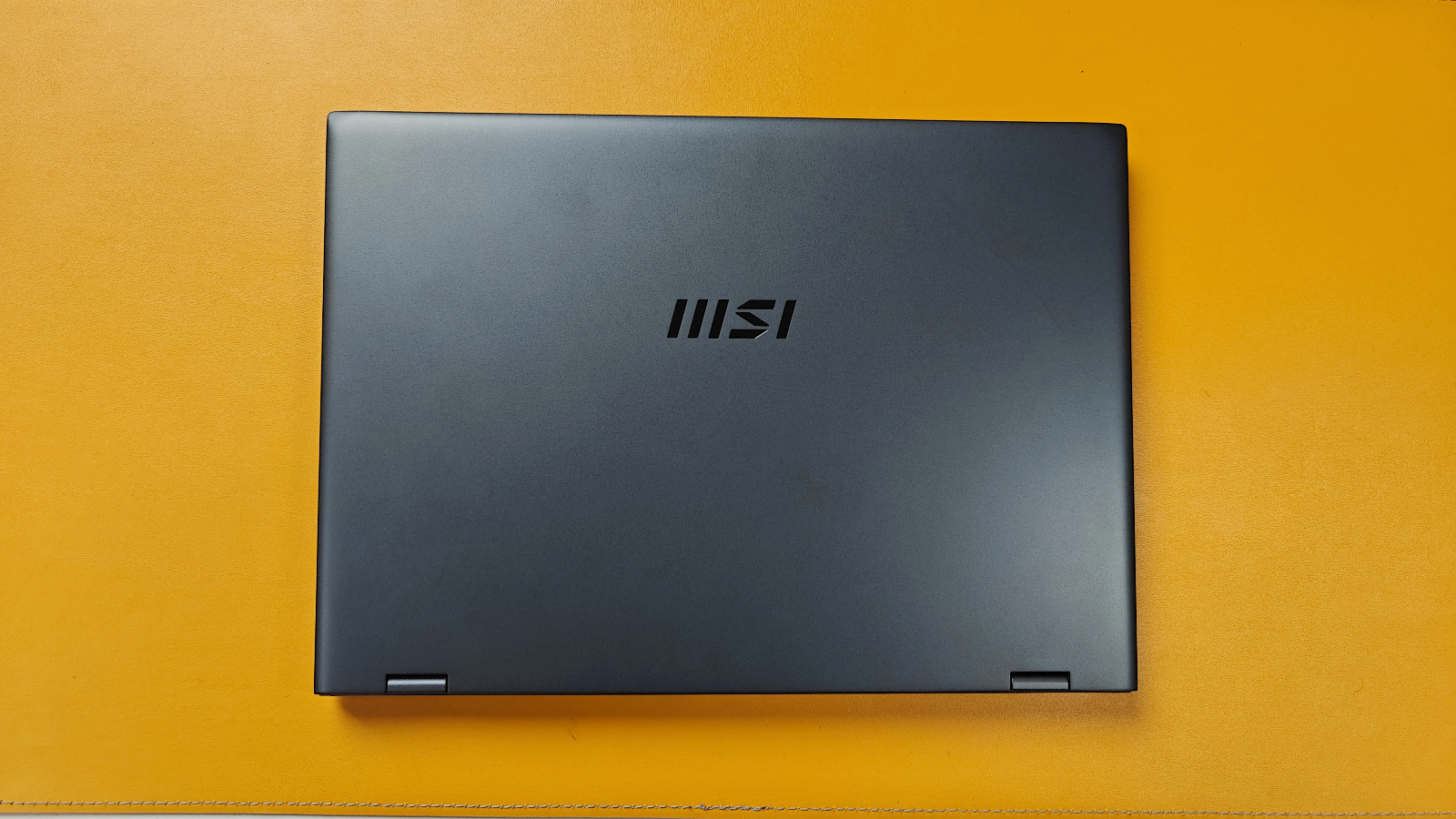
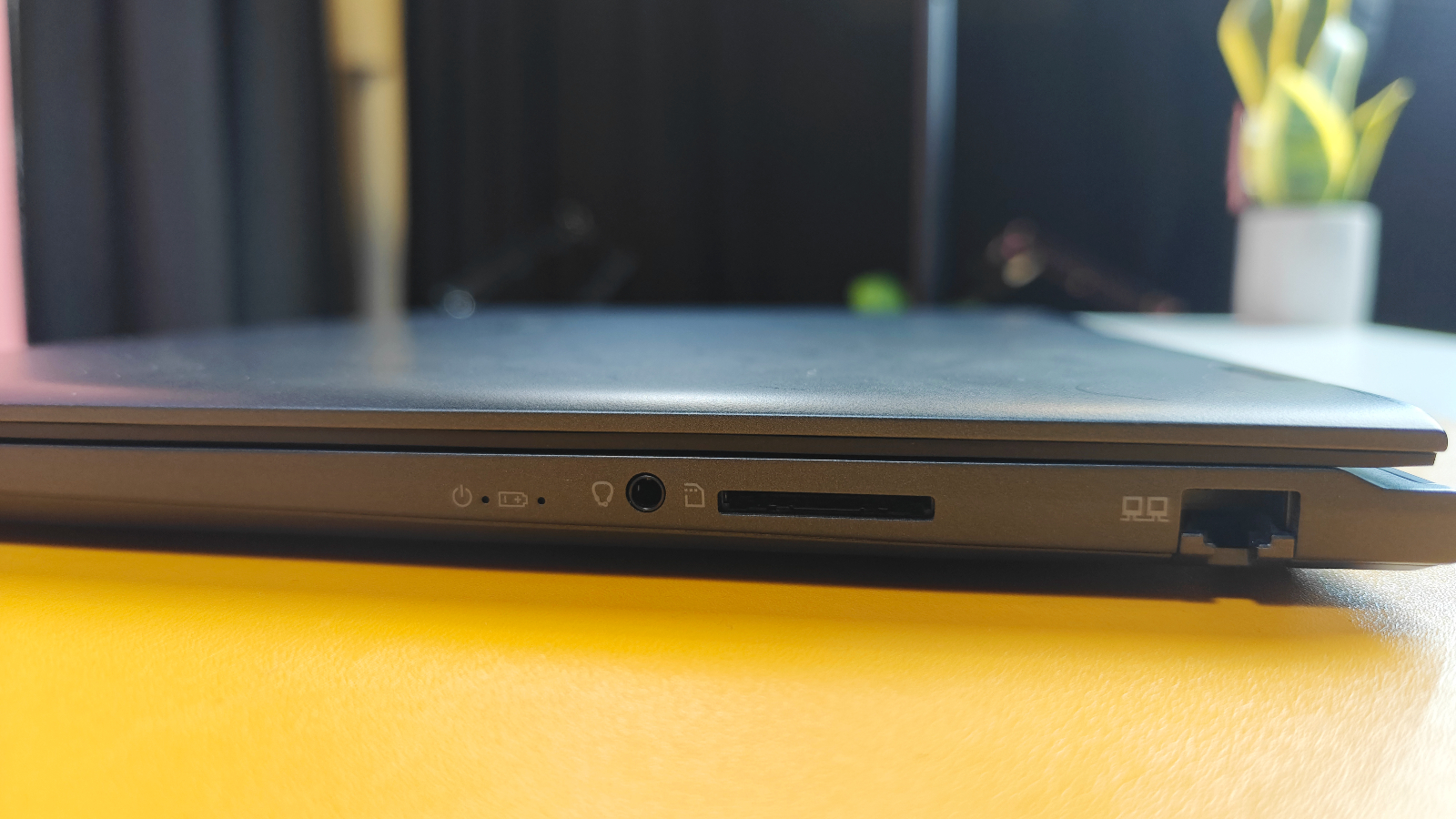
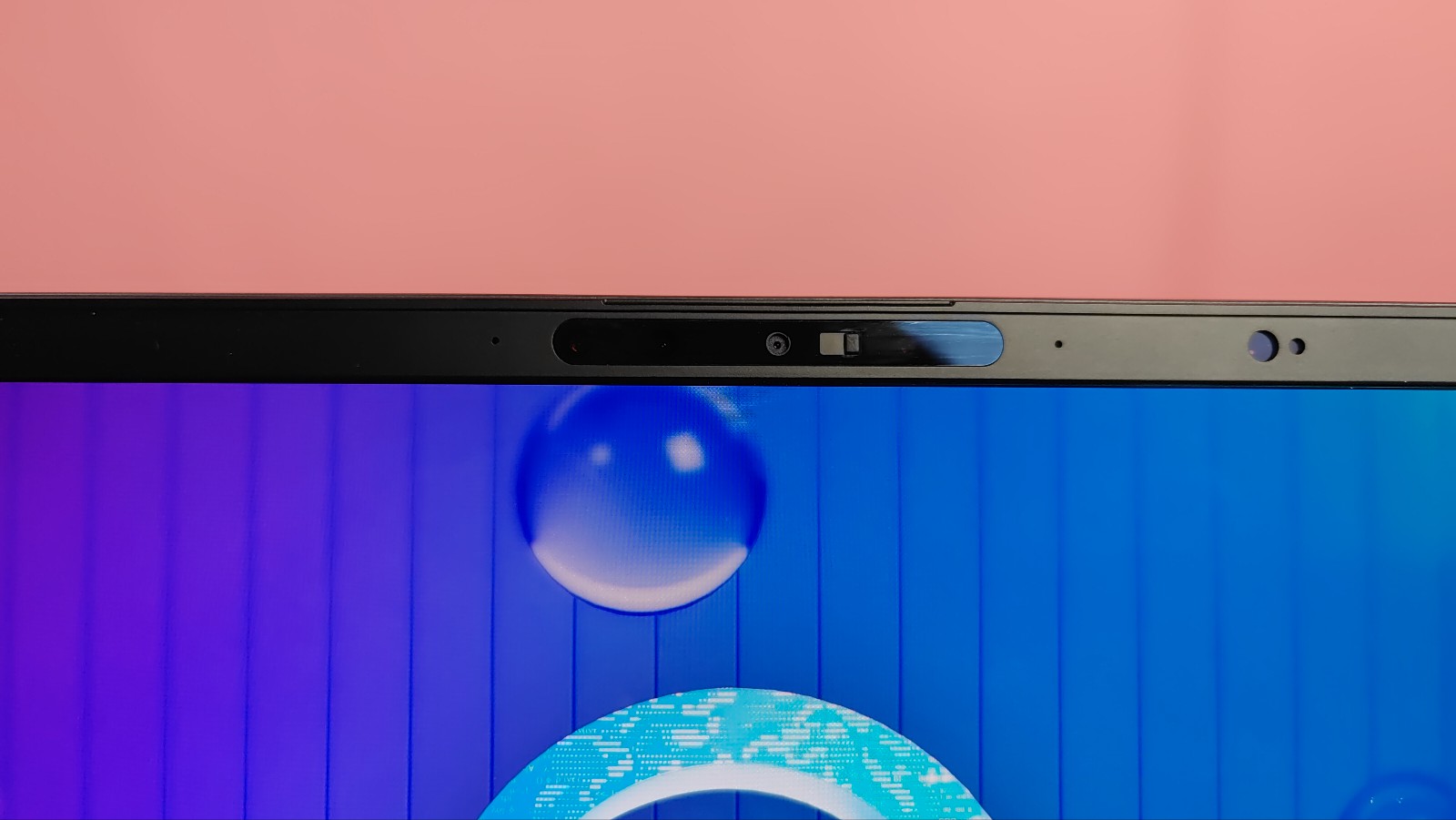
Specifications
Reasons to buy
Reasons to avoid
The MSI Prestige 16 AI Evo's fantastic balance of performance, battery life, portability, and glorious 4K OLED display make an easy laptop to recommend to almost anyone.
✔️ A vibrant, OLED display is your top "must have." The Prestige's display is one of its best features. With a wide color gamut and a native 4K resolution, virtually anything you toss on its screen looks fantastic.
✔️ You're looking for a great value. This laptop's performance, features, and price are well-balanced. Even for an "older" machine what it offers is still impressive, even up against newer laptops.
✖️ You want extremely long battery life. This laptop surpasses our 9-hour minimum, but it's becoming more common to find laptops that last between 15 and 20 hours on battery power.
✖️ You want a faster processor. The Prestige's performance is well beyond the speed of a tortoise, but it does have a last-gen chip. There are newer laptops that exceed what this one can do.
We originally reviewed the MSI Prestige 16 AI Evo at the end of 2023. Throughout most of 2024 is was our best Ultrabook pick — now it's our best overall 16-inch laptop. I've been writing buying guides for years, and I'm used to putting a laptop on a list like this, only to see it outranked by something else within a month or two. I can't recall another laptop that has stood the test of time like this one.
The Prestige 16 AI Evo is still a MacBook Air (M2 and M3) challenger "PC laptop enthusiasts have longed for," as Mark Anthony Ramirez wrote in his review for Laptop Mag. Its performance hasn't lost its luster, even compared to Intel's new Lunar Lake chips. It still has one of the most color-rich and sharpest 4K OLED displays we've ever tested. Its battery life still fares well against its rivals. It's still one of the lightest 16-inch laptops we've tested in the last year — and I've seen it go for a couple hundred dollars less than when it was originally released.
Performance-wise, this laptop still earns high marks for its multicore performance. In our Geekbench 6 test, the Prestige 16 AI Evo scored 13,310, higher than the mainstream laptop average of 10,435, and surpasses the 15-inch MacBook Air M3 by 10% (12,052). It also surpasses some of its newer, 16-inch competitors, like the Lenovo ThinkBook 16 Gen 7 with a Snapdragon X Plus XIP-42-100 by 14% (11,517) — and just pushes past the Asus Zenbook S16 with an AMD Ryzen AI 9 HX 370 by 1% (13,282).
Even with a last-gen chip, its Intel Core Ultra 7 155H has much faster multicore performance than Intel's current-gen laptop chips, Lunar Lake. The Core Ultra 7 258V in the Acer Swift 14 AI (11,009) I recently reviewed is 18% slower by comparison. (Ouch!)
The Prestige 16 AI Evo's 4K OLED display produces sharp, vibrant images and deep, inky black contrasts. It's no wonder the display is one of the best you'll find in a 16-inch laptop — it covers 137.9% of the DCI-P3 color gamut, well beyond the average mainstream laptop (81.5%). That's near-par with one of its display rivals, the LG Gram Pro 16 2-in-1 (133.5%), and beyond the Lenovo Yoga Pro 9i (105.7%) and Samsung Galaxy Book 4 Ultra (81.8%).
It has great battery life, too: 13 hours and 4 minutes, about 2 hours longer than the average mainstream laptop. It's not the longest we've tested — the MacBook Air gets over 15 hours, and the ThinkBook 16 Gen 7 gets an incredible 21 — but its battery lasts longer than other 16-inch Ultrabooks like the Zenbook S16 (11 hours).
See our full MSI Prestige 16 AI Evo review.
Best budget laptop
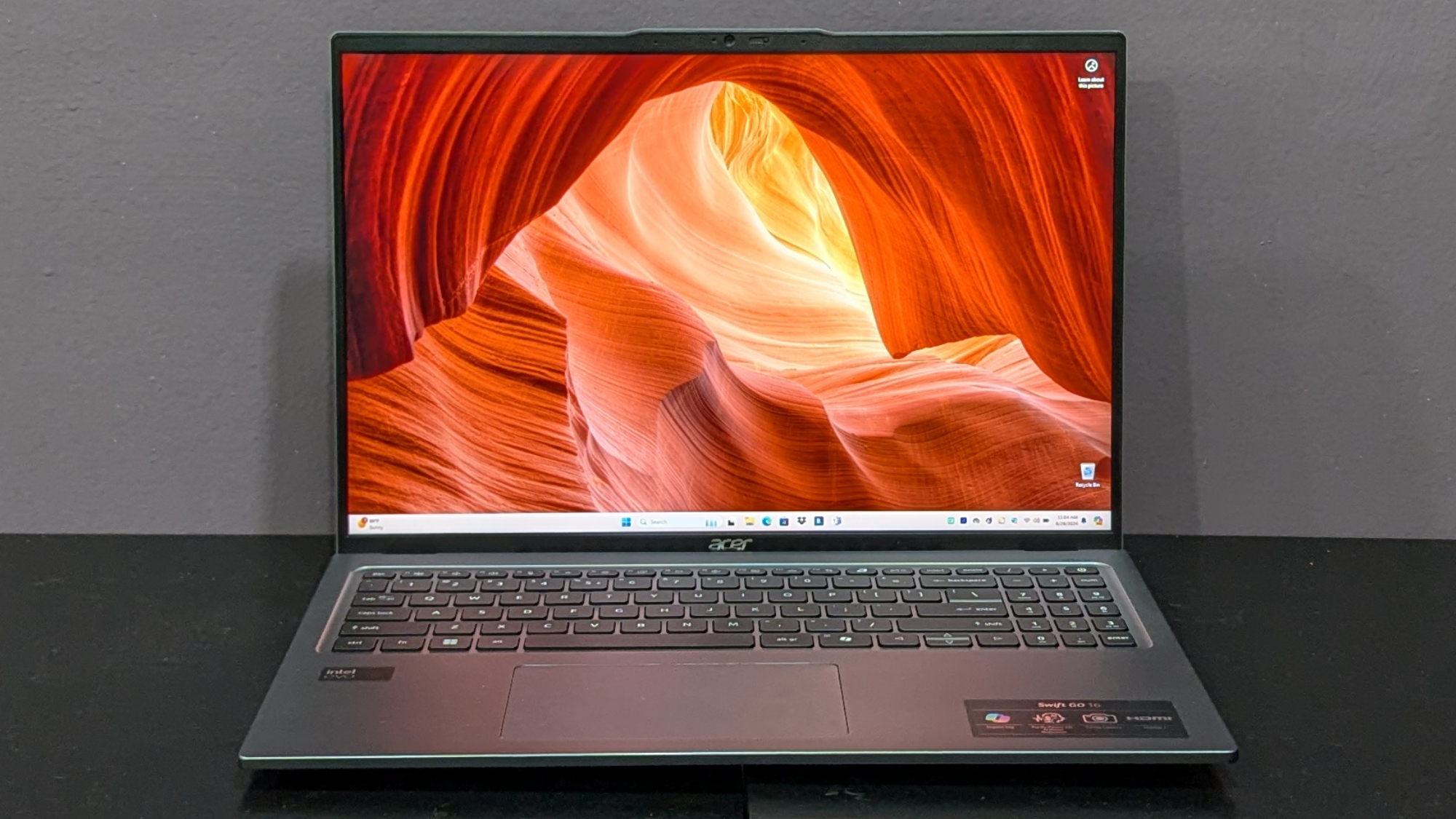
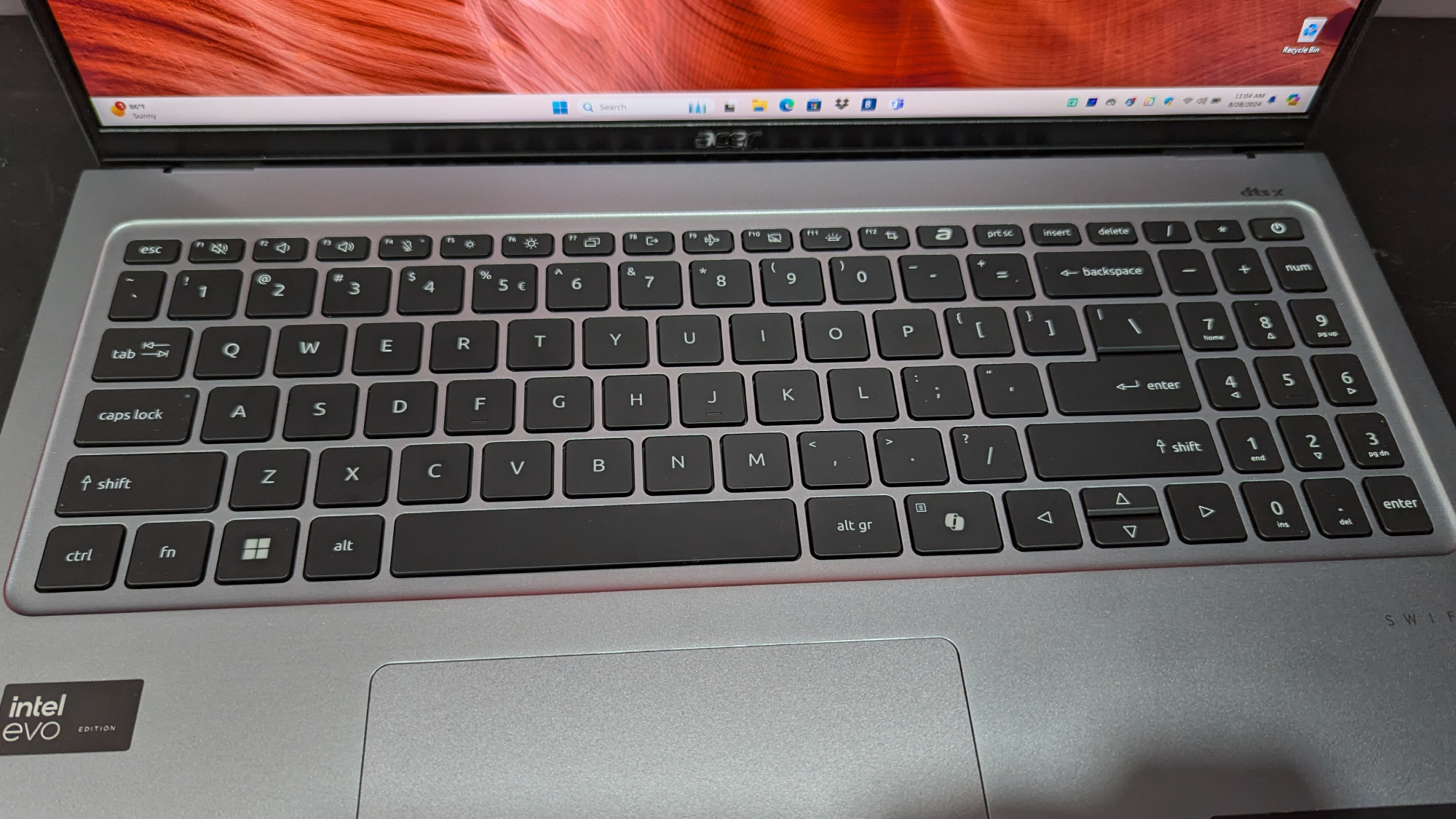
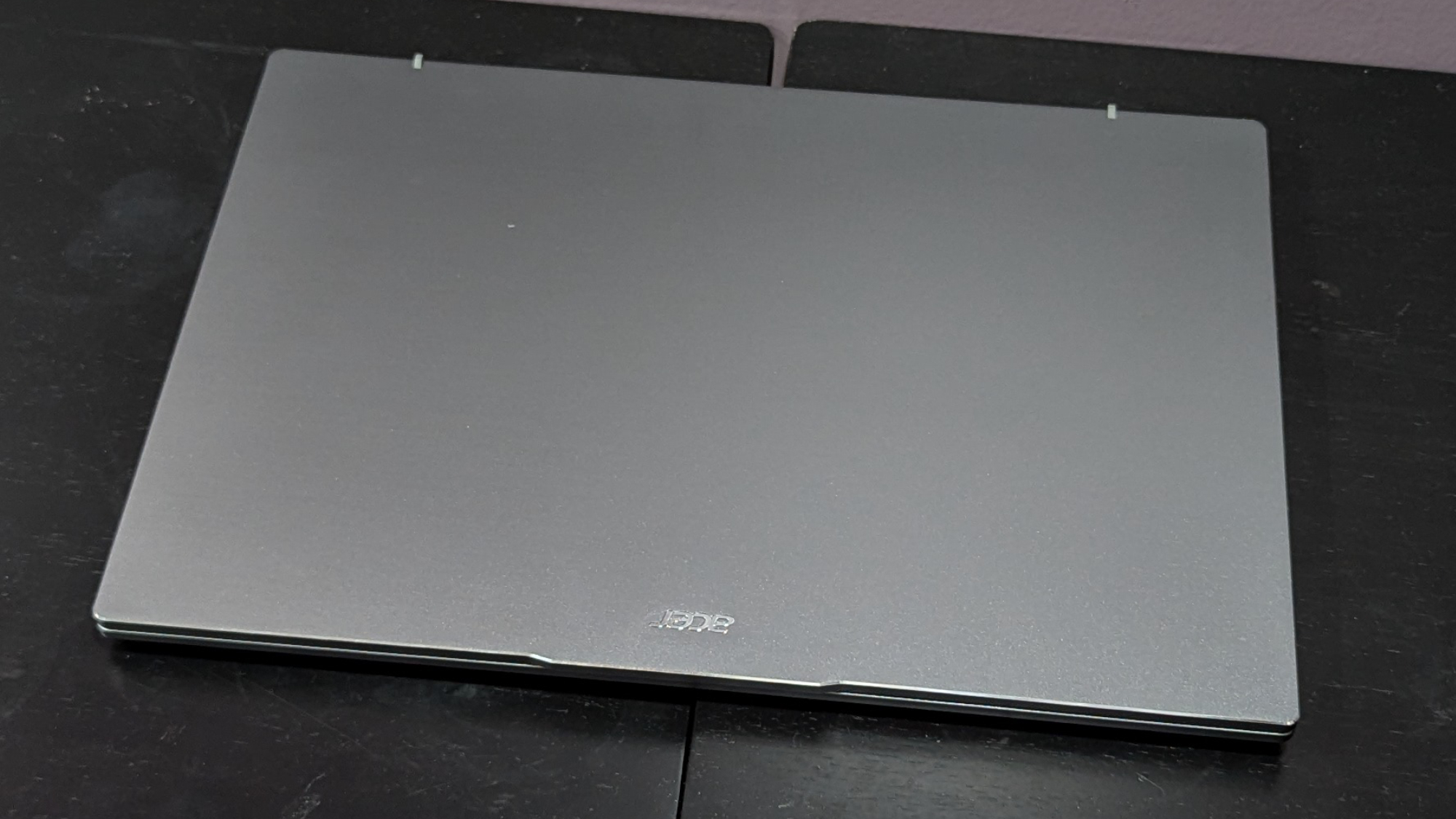
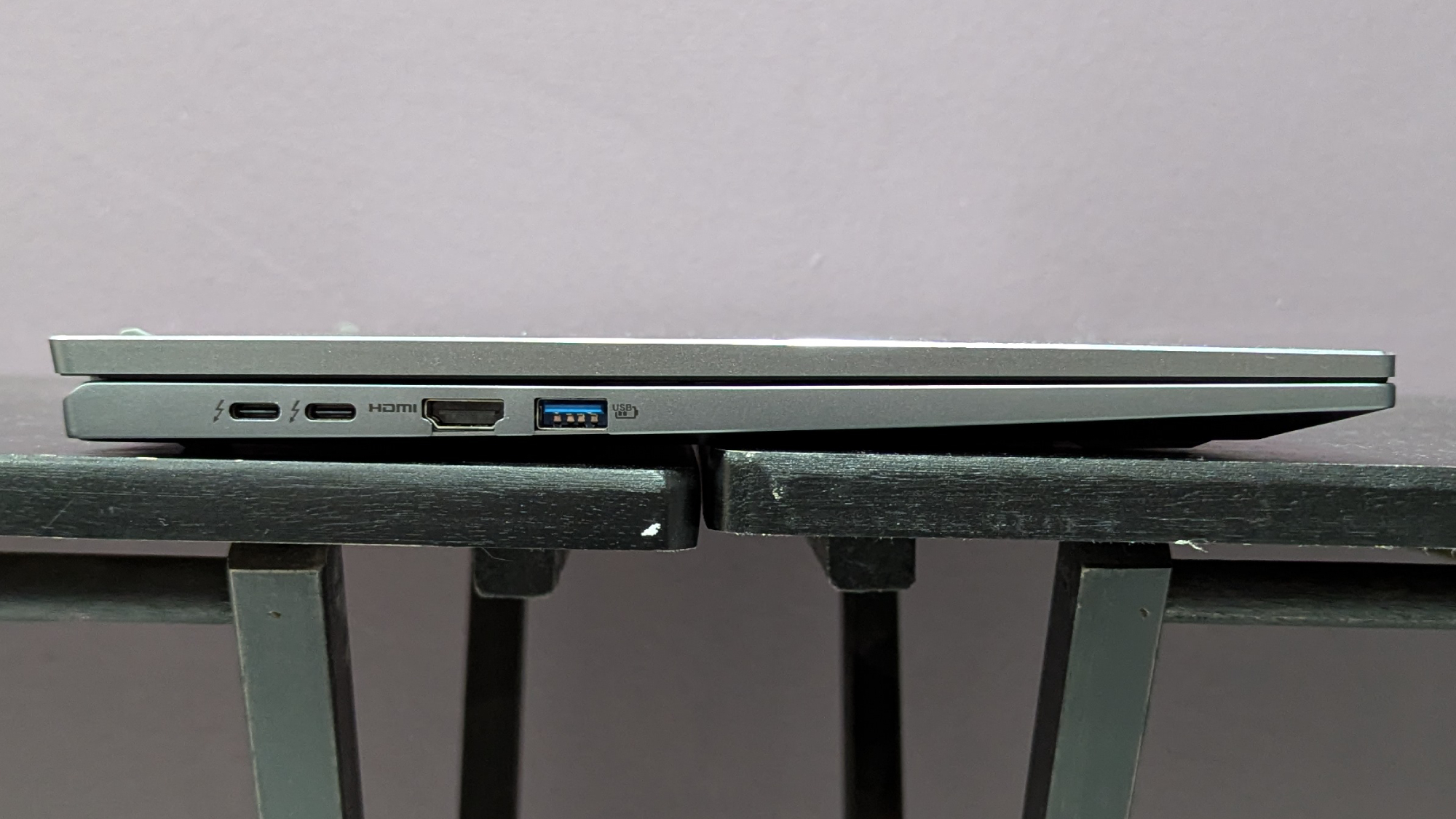
Specifications
Reasons to buy
Reasons to avoid
The Acer Swift Go 16 is a fantastic laptop that doesn't sacrifice performance, making it a great option for the budget-minded. It also sports a colorful IPS panel, and clear and balanced audio.
✔️ You want incredible performance at a low price. This laptop also offers solid battery life, a great display, and good speakers. Finding it on sale for under $1,000 almost feels criminal.
✔️ A thin and light laptop is your next must-have feature. It's barely over a half-inch thick and weighs under 4 pounds. Power plus portability? Great combo.
✖️ You need much more battery life. Like a lot of 16-inch laptops, this one might need frequent trips to a wall outlet, depending on how you use it.
✖️ Squishy keyboards are your arch nemesis. And this one, as our reviewer described, is spongy.
If the Acer Swift Go 14 has no right being so good for its price, then the 16-inch Acer Swift Go also has no right — but we're not complaining! This laptop is normally $1,199, but we've seen this configuration go for $900 on Amazon. $900 for a last-gen, top-tier Intel Core Ultra 9, Arc integrated graphics, 32GB of RAM, and 1TB of storage space is a great deal.
But even without a sale, Acer did a great job balancing "a reasonable price point" with "strong performance, long-lasting battery life, and a colorful display," as our writer, Claire Tabari, said in her review.
On the Geekbench 6 multicore performance test, this laptop scored 13,088, close to the Asus Zenbook S16's 13,282 (2.5% slower). Interestingly, it doesn't quite catch up to the MSI Prestige 16 AI Evo's mid-tier Intel Core Ultra 7 (13,310), but it does surpass the MacBook Air M3 (12,052.)
The Swift Go 16 fared better in Laptop Mag's real-world Handbrake benchmark. It took 4 minutes and 51 seconds to transcode a 4K video to 1080p, faster than the Zenbook S16 (5:08), Inspiron 14 Plus (6:23), and Prestige 16 AI Evo (5:17).
Compared to the Zenbook S16's OLED display, the Swift Go 16 covers a larger portion of the DCI-P3 color gamut, 86% to 80%, respectively. That's also higher than the Inspiron 14 Plus (69%.) We do wish it was brighter, though. It averaged only 332 nits in our colorimeter tests. It didn't fall far behind the Zenbook S16 (357 nits); there's no contest against the Inspiron 14 Plus (470 nits).
This laptop has decent battery life at 10 hours and 35 minutes, which is one hour shy of the Zenbook S16, but far less than its competitors. What grinds our teeth the most about this laptop, unfortunately, is its keyboard — specifically, how it feels to press the keys. They're shallow and spongy.
See our full Acer Swift Go 16 review.
Best premium laptop
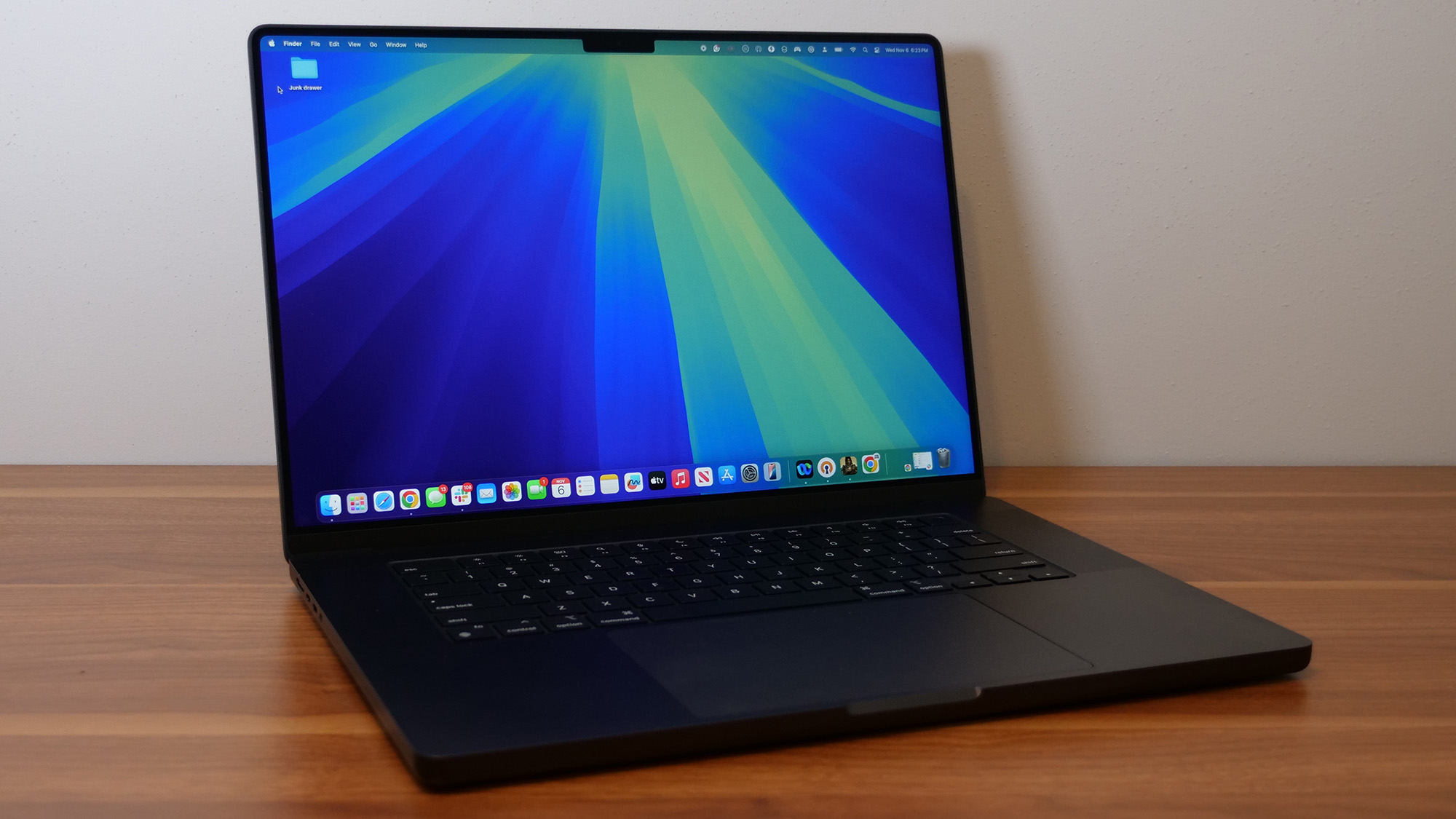
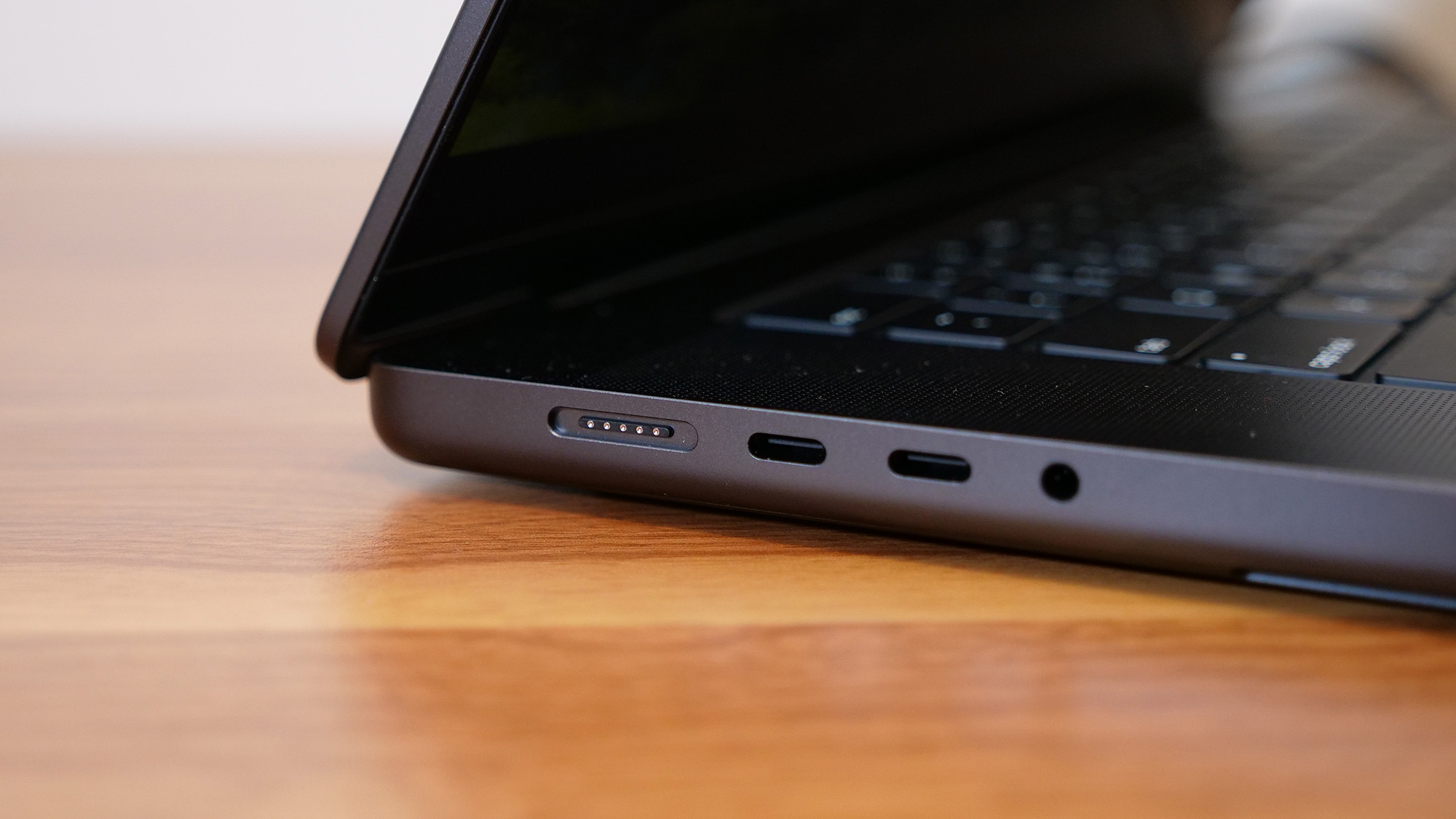
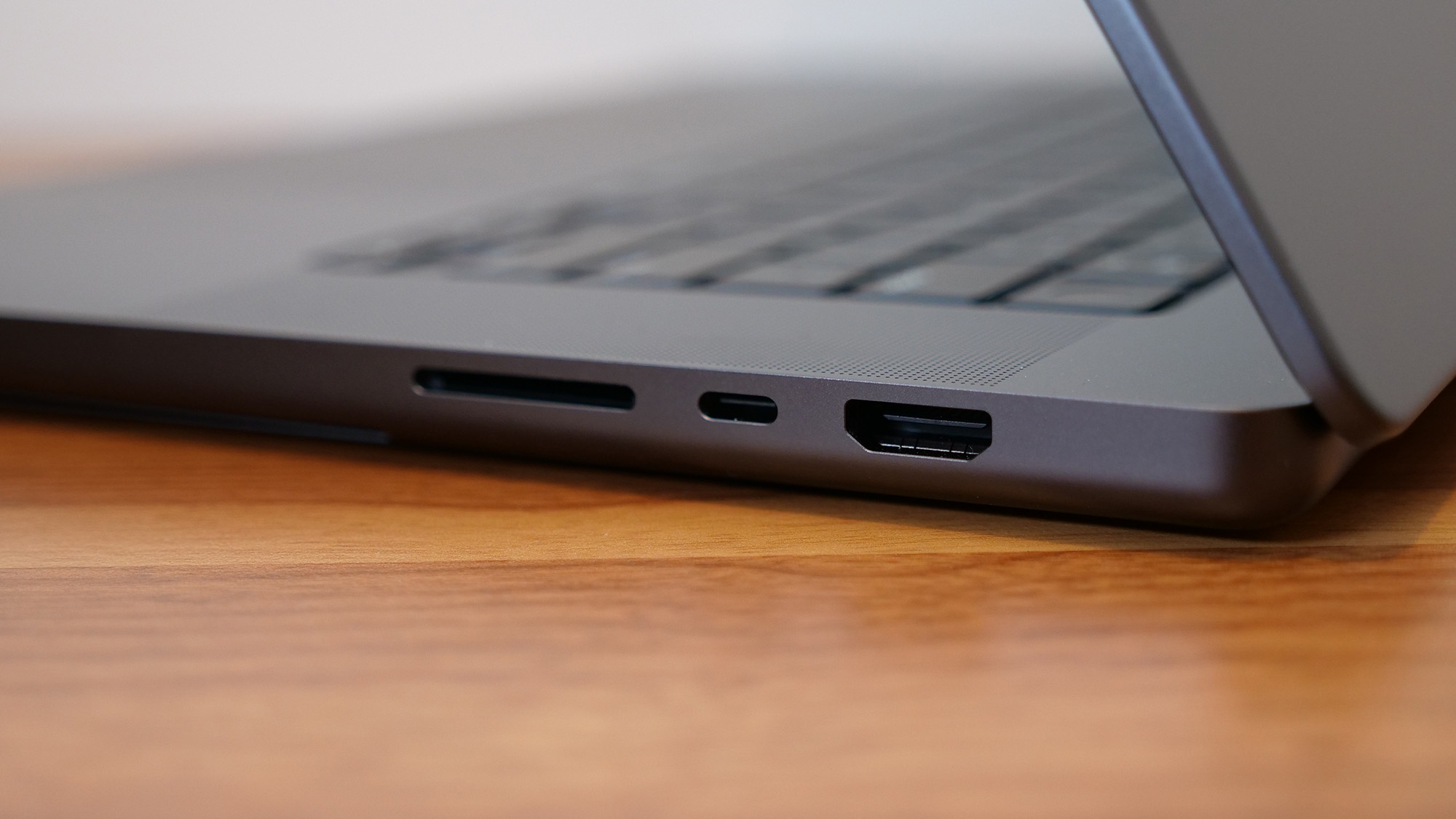
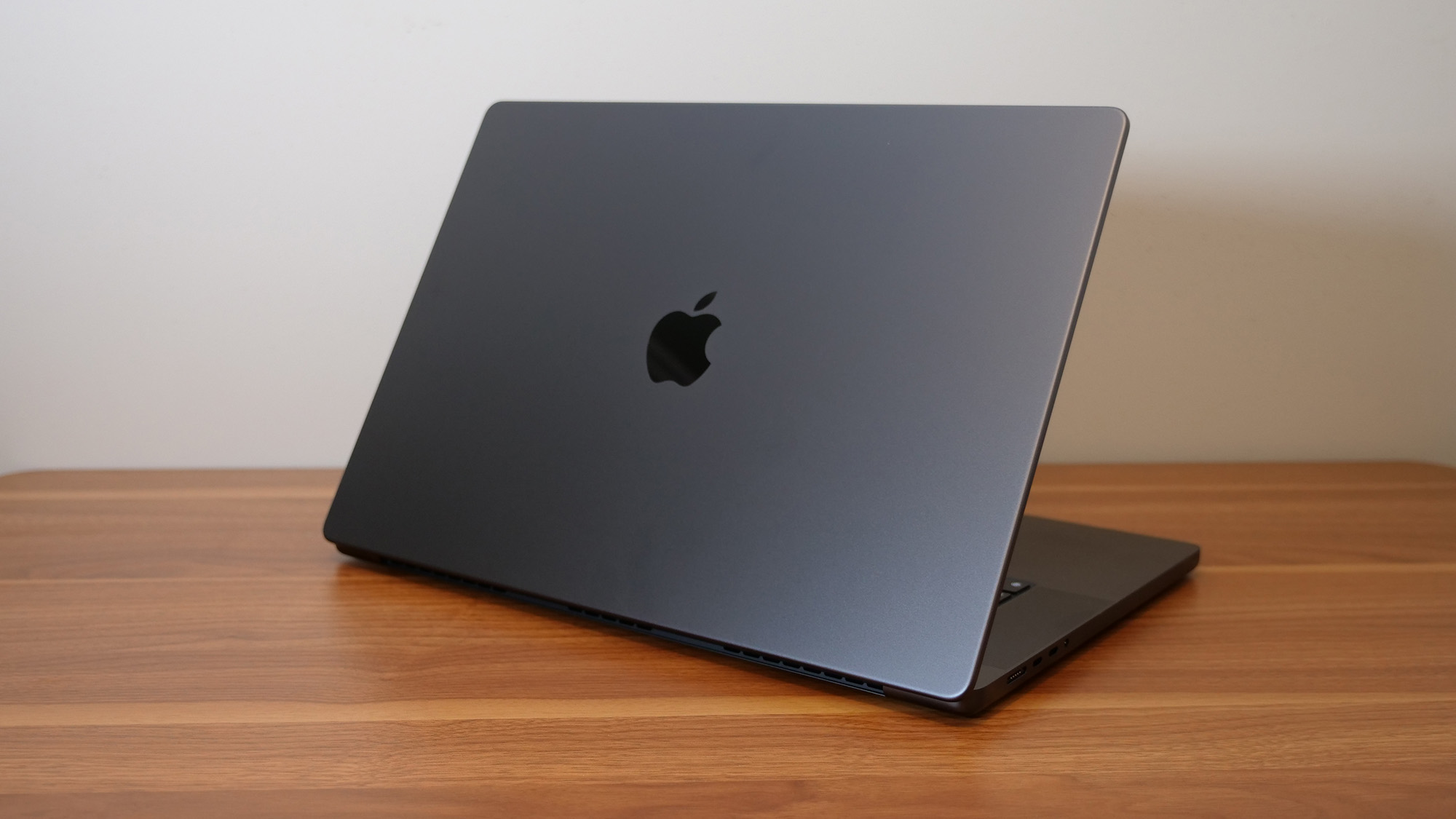
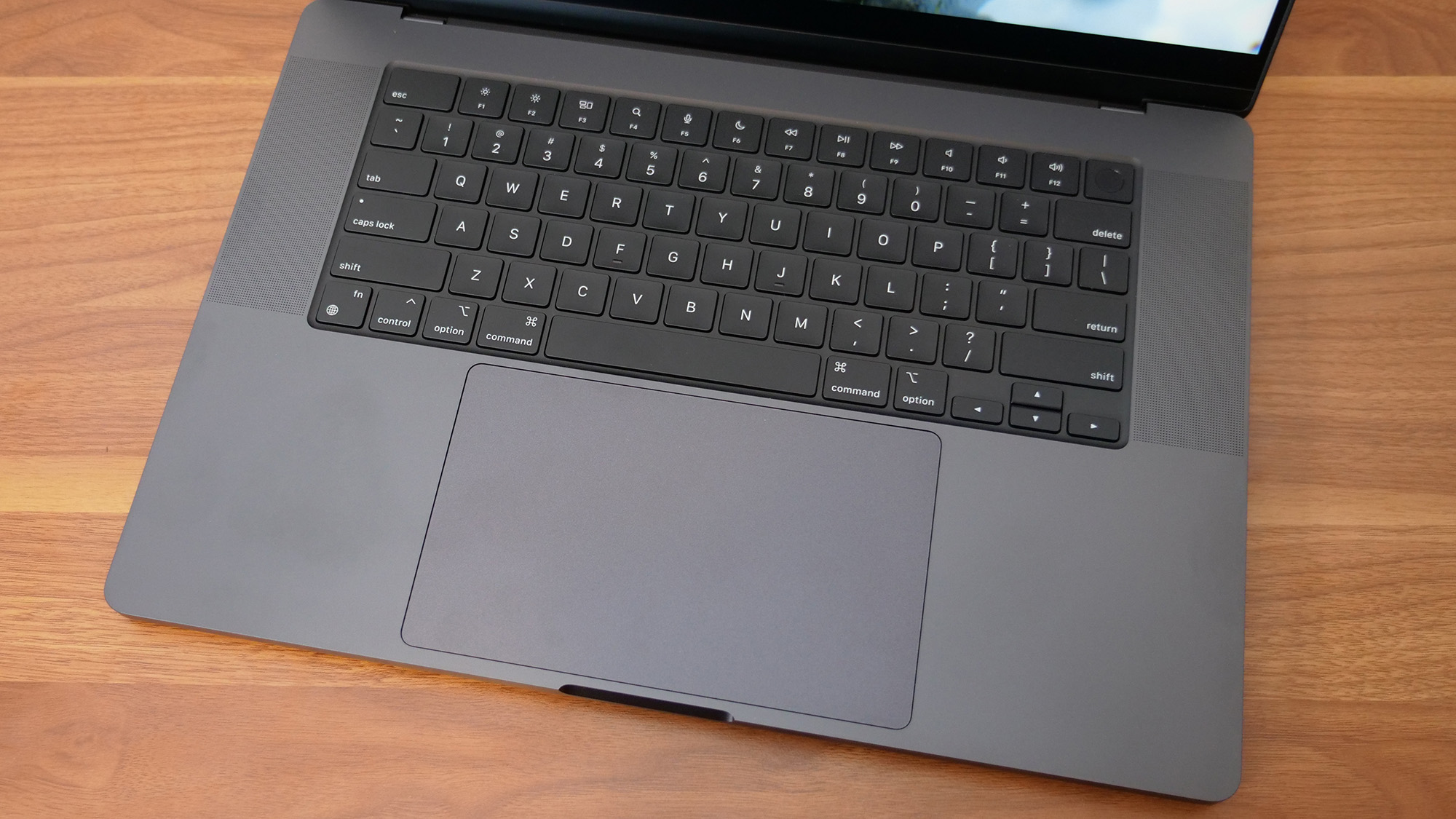
Specifications
Reasons to buy
Reasons to avoid
Apple has outdone itself with its 16-inch MacBook Pro M4 Pro: wicked-fast performance, phenomenal battery life, an incredibly bright display, fantastic keyboard and trackpad, robust sound, one of the best webcams we've ever seen in a laptop — there's so many wonderful things about it.
✔️ You want the best battery life. At nearly 21 hours, there are few laptops that can run that long — especially 16-inch laptops.
✔️ You need a personal machine that can double as a workstation. Web browsing, video calls, photo and video editing, and even gaming — if you need a single device that can do all those things quickly and reliably, this laptop has you covered.
✖️ It's too much laptop for your needs. It's a tremendous machine, but if all you need is something to check your emails, you'll barely tap into the MacBook Pro M4 Pro's capabilities.
✖️ You want to avoid the Apple tax. The base $1,999 configuration still only comes with 512GB of storage space — and Apple bumped up the base specs for its newest MacBook generation.
For anyone (especially creatives) who needs a personal machine that can also handle heavy video and 3D rendering workloads, there's the newest 16-inch Apple MacBook Pro with an M4 Pro processor.
Laptop Mag's managing editor, Sean Riley, describes it best in his review: "It's almost simultaneously the most powerful premium laptop we've reviewed while also offering the second-longest battery of any laptop we've tested." Our benchmark numbers mostly speak for themselves.
With 20 hours and 46 minutes of battery life, it lasts 7 hours longer than the average premium laptop and its main competitors, the Lenovo Yoga Pro 9i 16 Gen 9 and Asus ProArt PX16 (2024), between 10 and 11 hours, respectively. It also outlasts the MacBook Pro M3 Max by nearly 3 hours.
It outshines them all in the Geekbench 6 multicore benchmark, scoring 22,822. That's 47% faster than the Yoga Pro (12,141), 32% faster than the ProArt PX16 (15,286), and over 100% more than the average premium laptop (10,492). Compared to the M3 Max (21,182), that's an 8% speed increase; remember that the 16-inch Max configurations start at $3,499.
Everything else about this MacBook Pro is just as good or better than previous generations. It's still expensive, but it's our best premium laptop pick for a reason.
See our full MacBook Pro 16 (M4 Pro, 2024) review.
Best gaming laptop
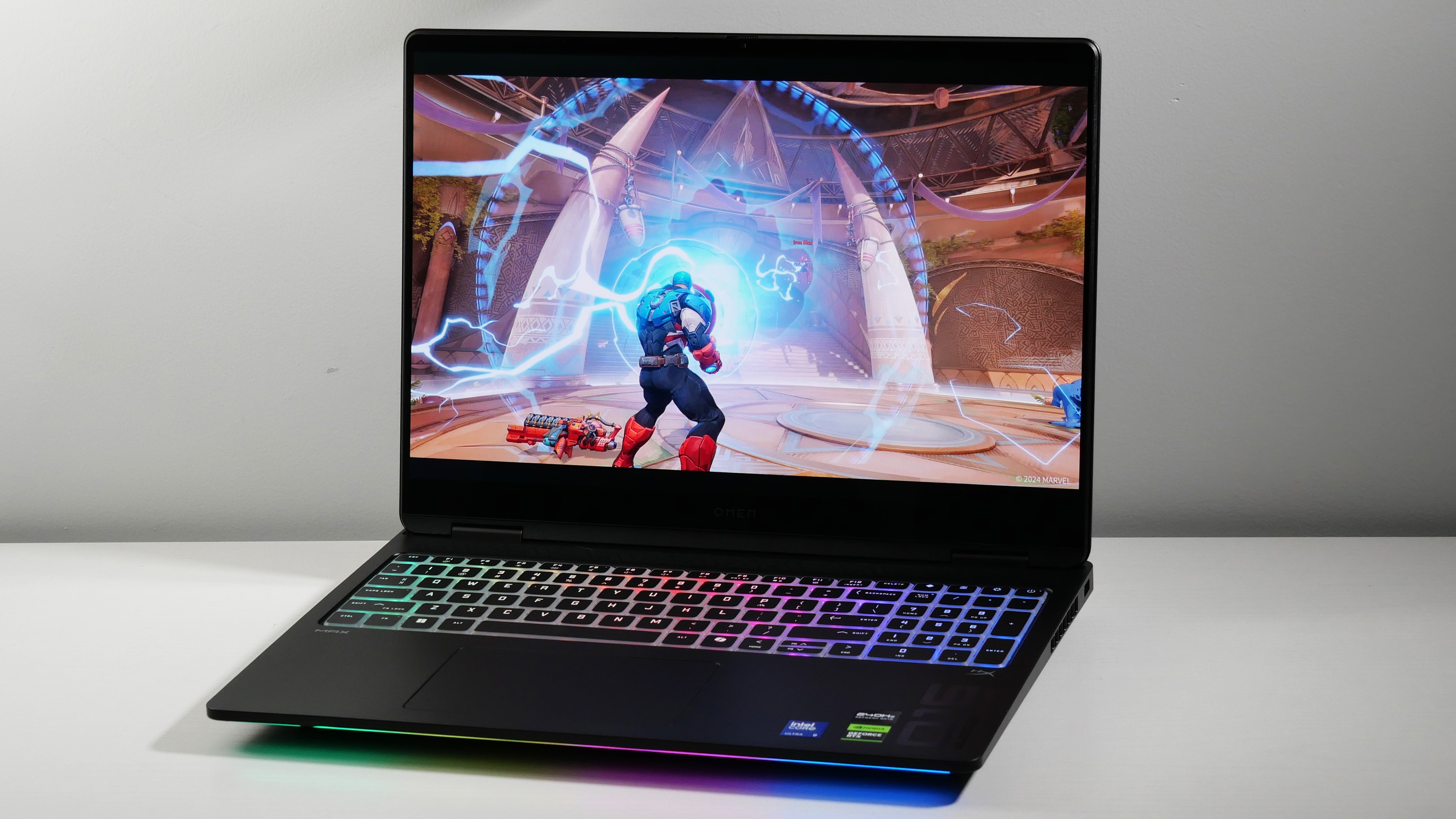
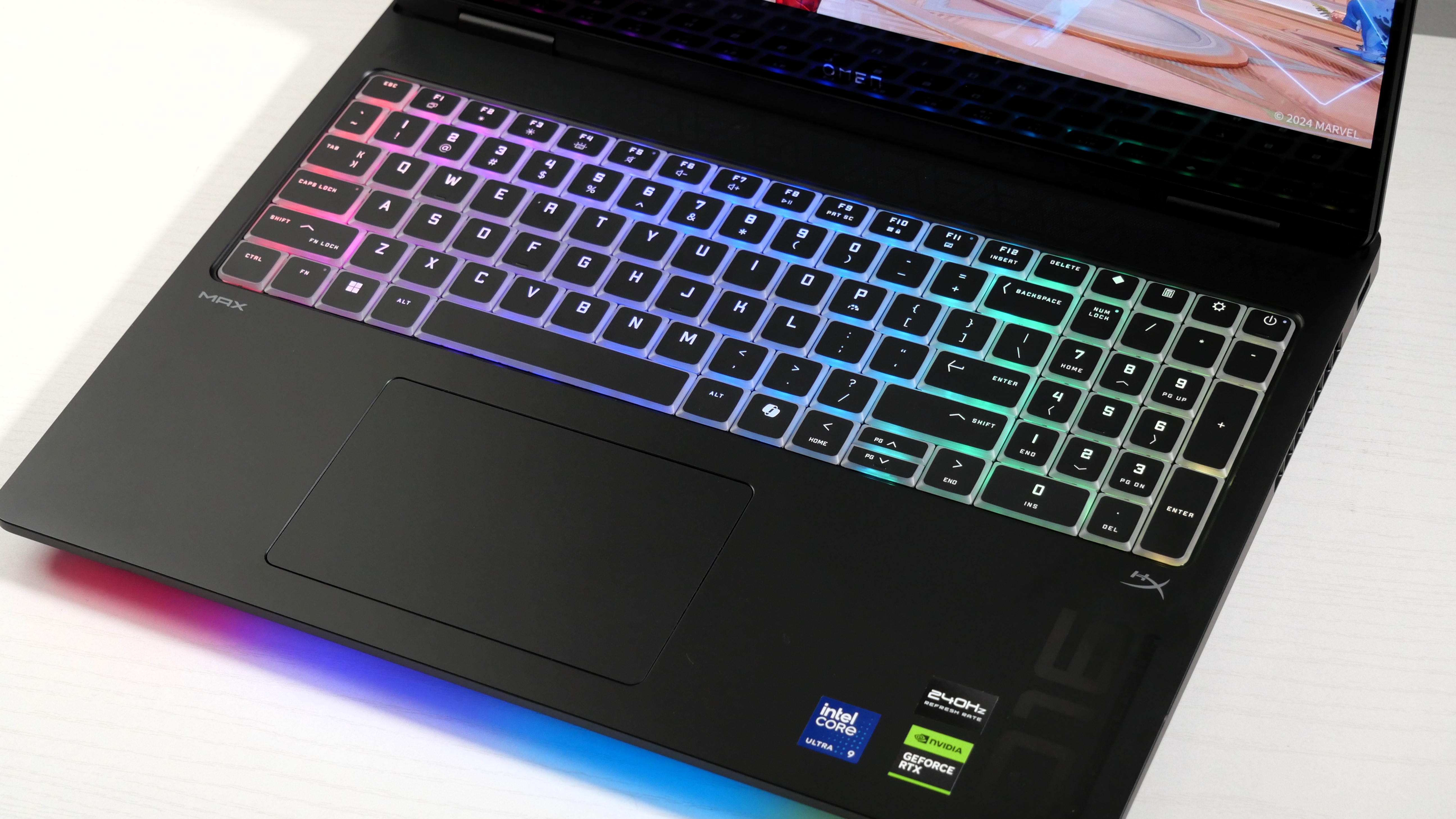
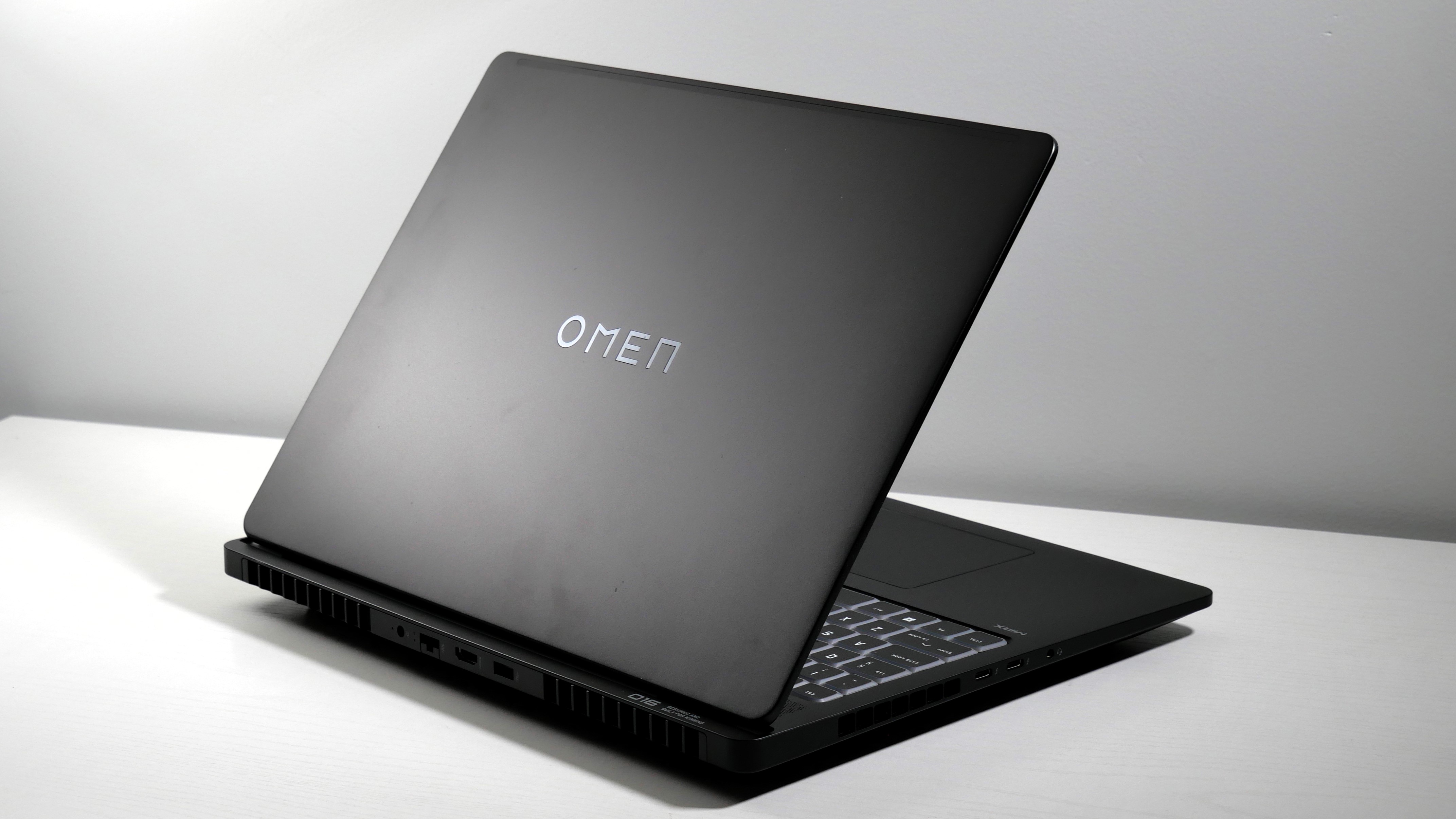
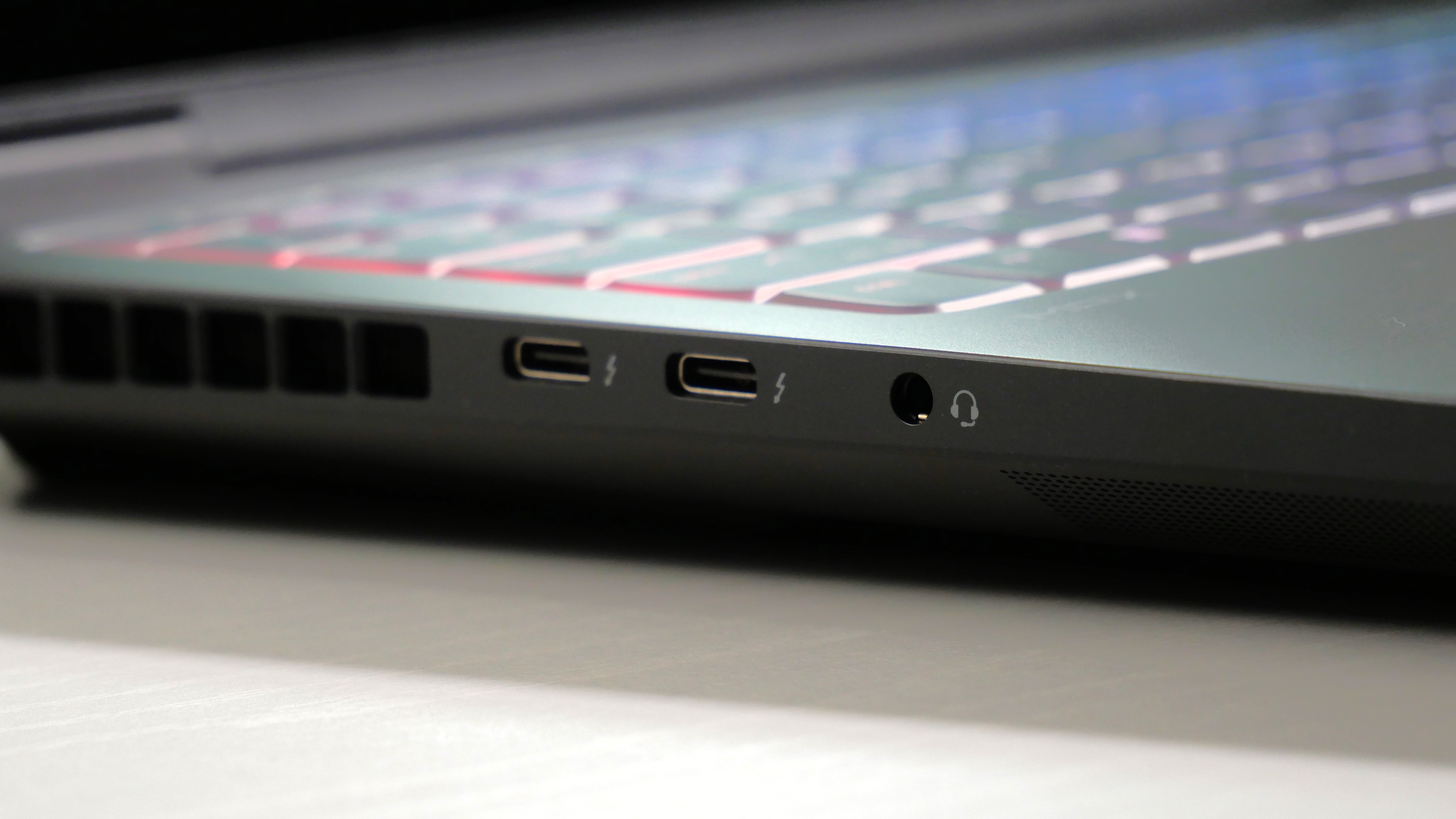
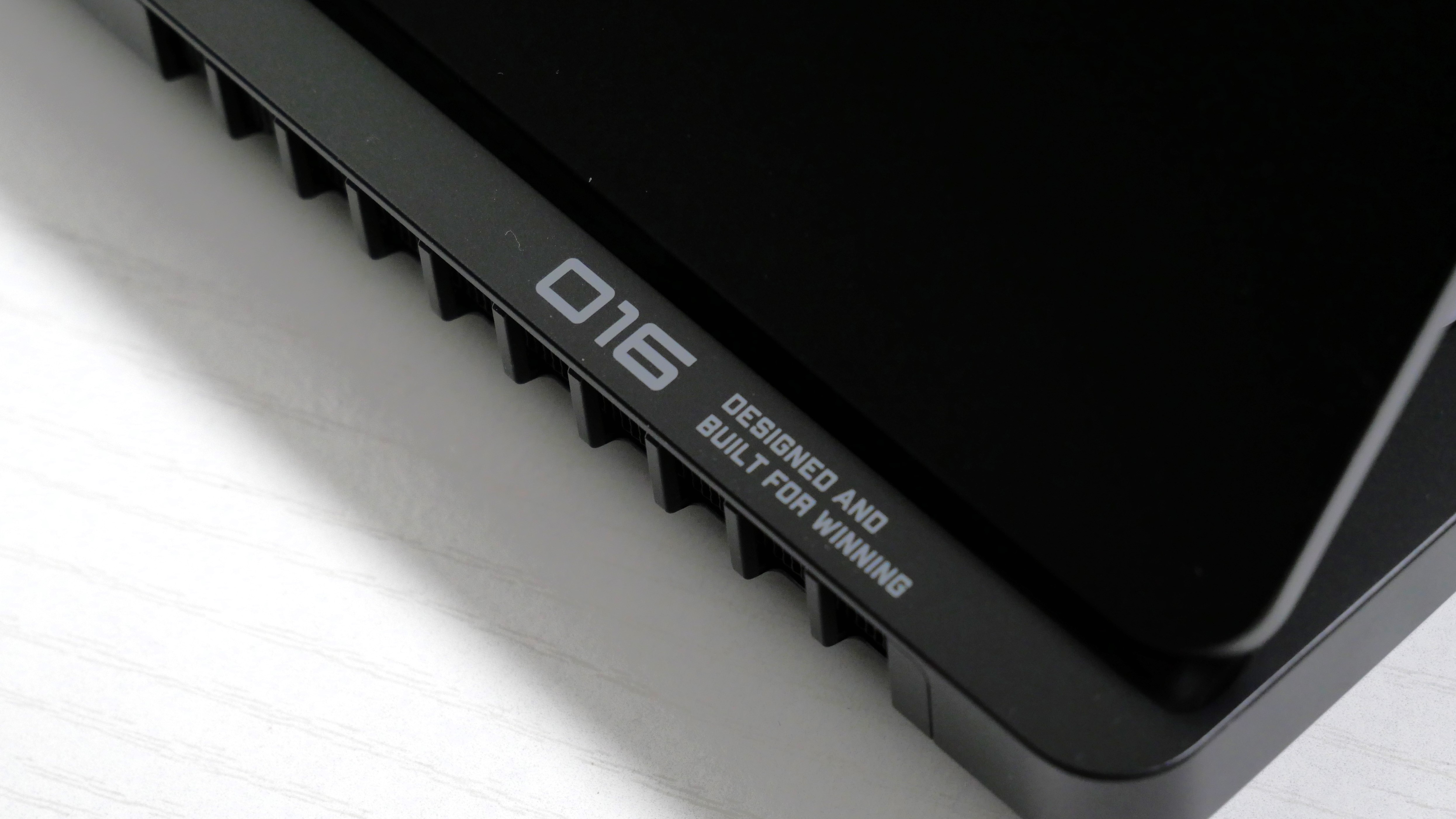
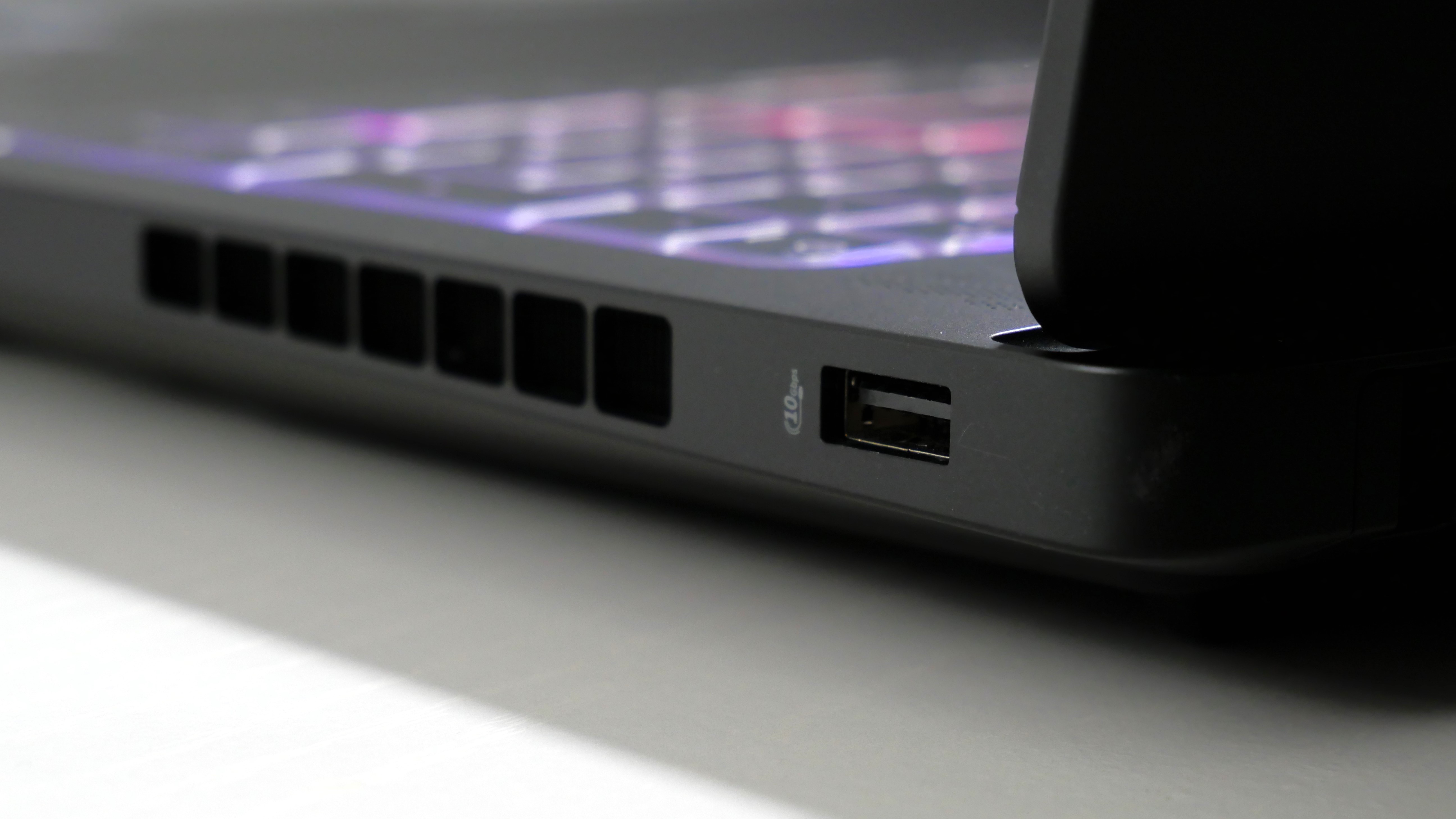
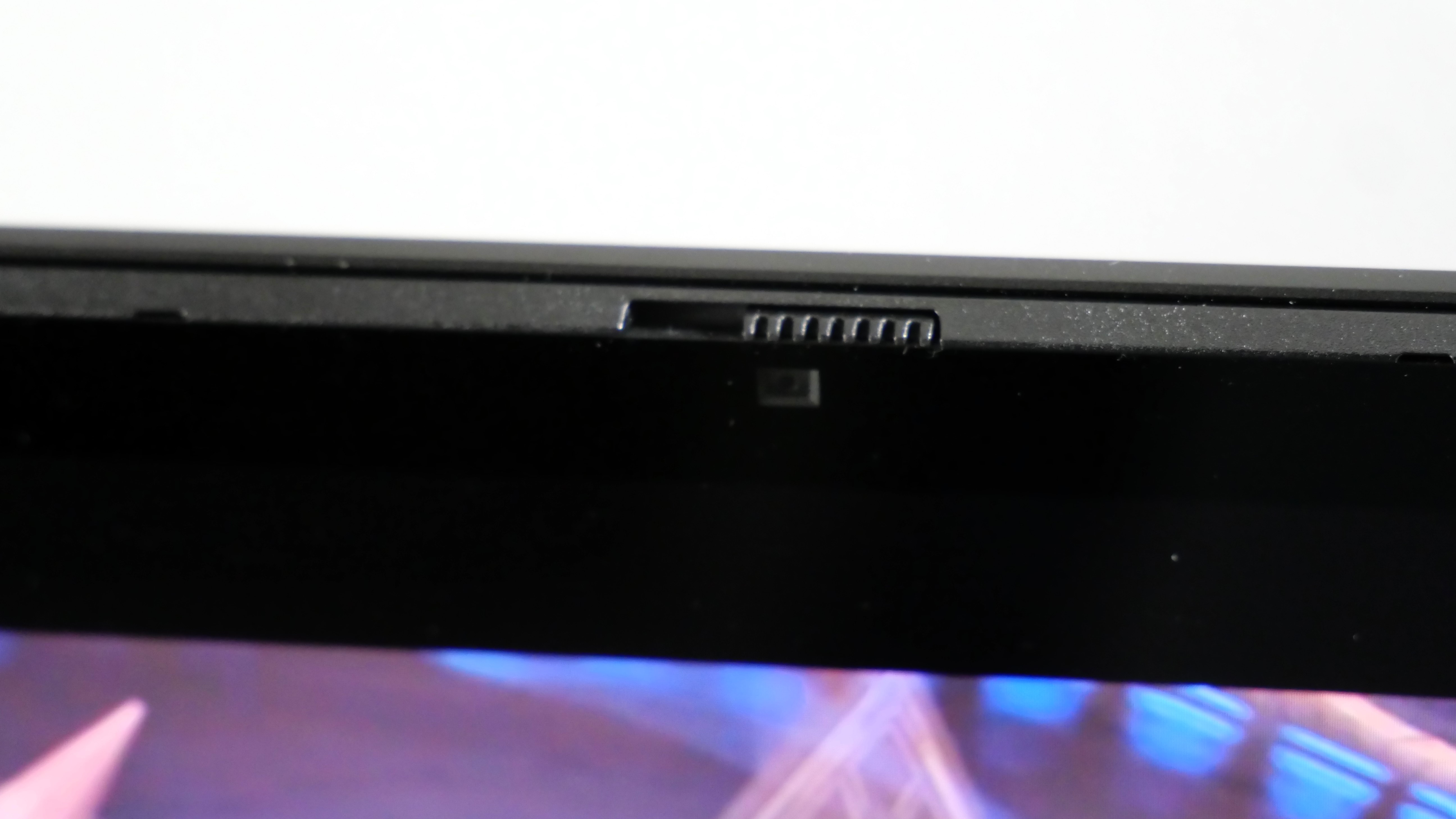

Specifications
Reasons to buy
Reasons to avoid
The HP Omen Max 16 impressed reviewer Rami Tabari in key areas, writing, "And for the most part, HP delivered with its powerful overall performance, epic display, solid keyboard, and decent heat management."
✔️ You want a brilliant OLED gaming experience. Our reviewer: "I can’t remember the last time I’ve seen a display this drop-dead gorgeous. "
✔️ Overall performance is a non-negotiable for you. The Omen Max's Intel Core Ultra 9 275HX processor and 32GB of RAM breezily handled a couple of dozen Chrome tabs and a simultaneous download, and several YouTube videos playing.
✖️ It's here for a good time, not for a long time. Up against other gaming laptops, the high-performing Omen Max has a relatively short battery life, surviving 3 hours and 20 minutes before dying in the Laptop Mag battery test. However, this may not be an issue if you primarily game plugged in.
✖️ You're on a budget. Based on the specs, the base model starts at $2,499, which is still perhaps too high. Other configurations might be out of your price range for what they offer, which can still be impressive.
Gaming laptops are the hot rods of the computing world, and what they lack in some areas, they more than make up for in others. In the key areas — performance, display, temperature, and the tactile nature of the keyboard — the HP Omen Max 16 shone in our reviewer Rami Tabari's experience.
The review unit tested by Laptop Mag includes the powerful Nvidia RTX 5090 GPU and a gorgeous 16-inch OLED display as its canvas. It can be outfitted with an Intel Core Ultra 9 275HX processor and up to 32GB of RAM for the best possible gaming performance you can get on the Omen Max.
See our full HP Omen Max 16 (RTX 5090) review.
Best 2-in-1 laptop
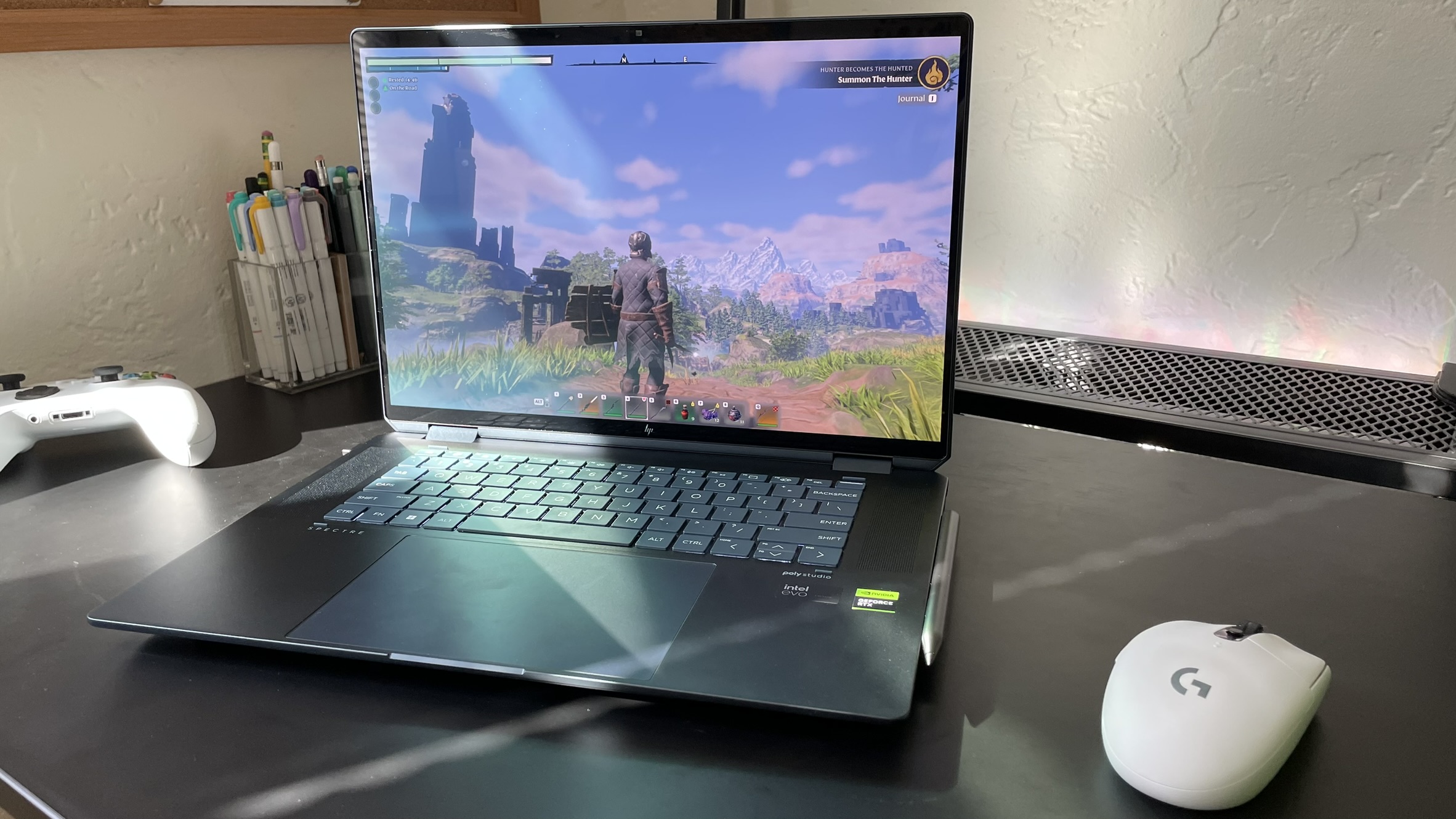

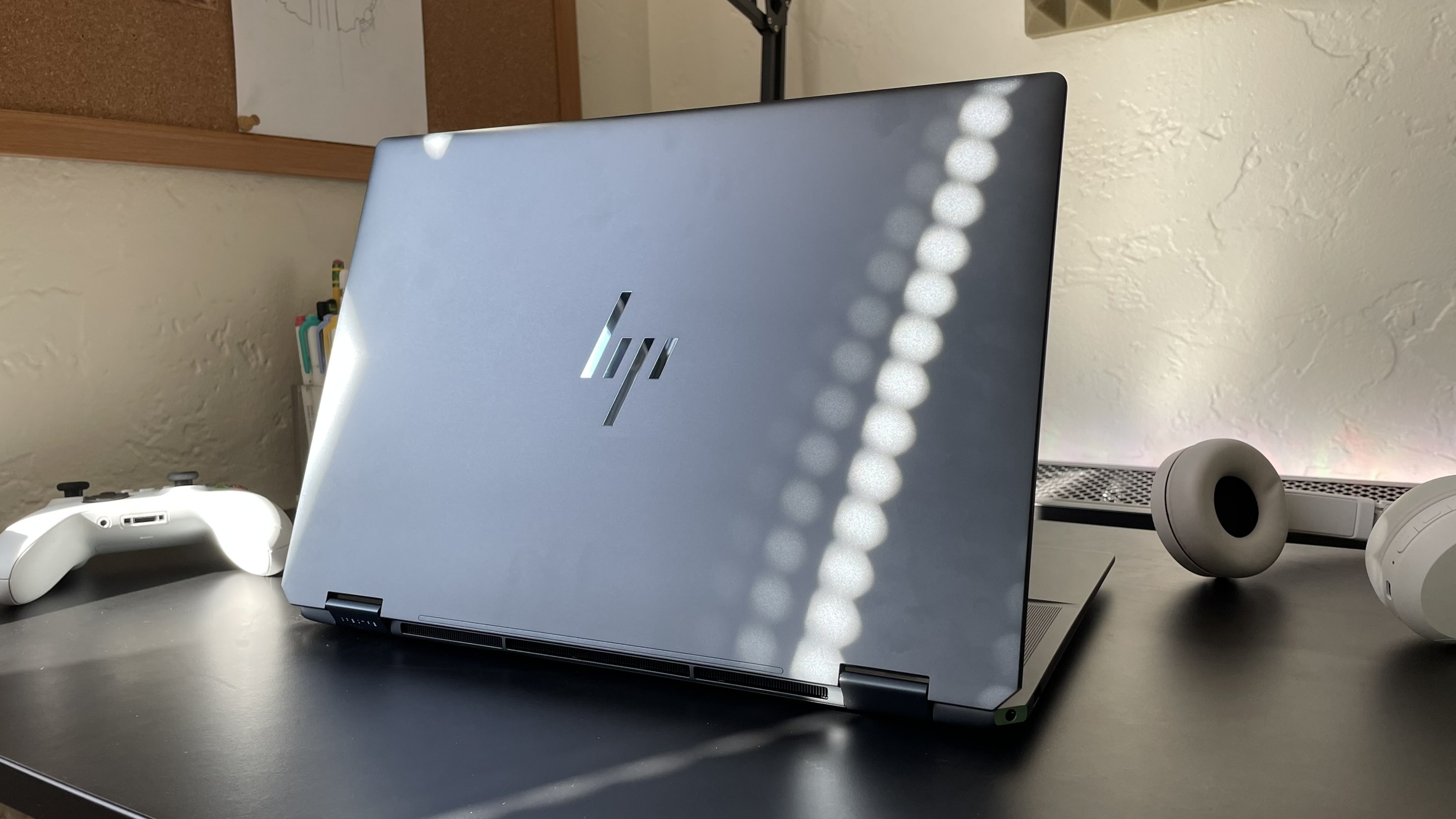
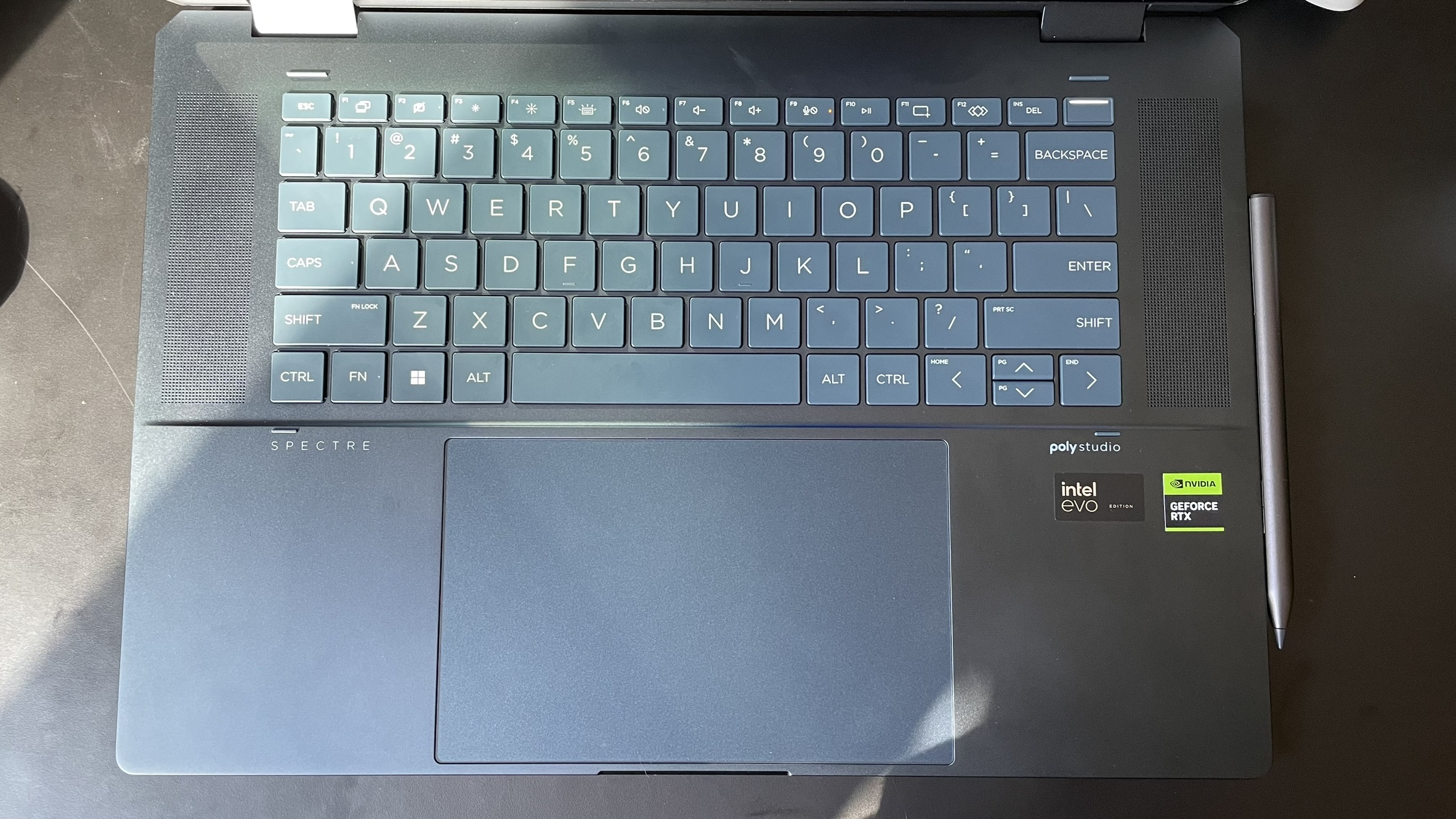
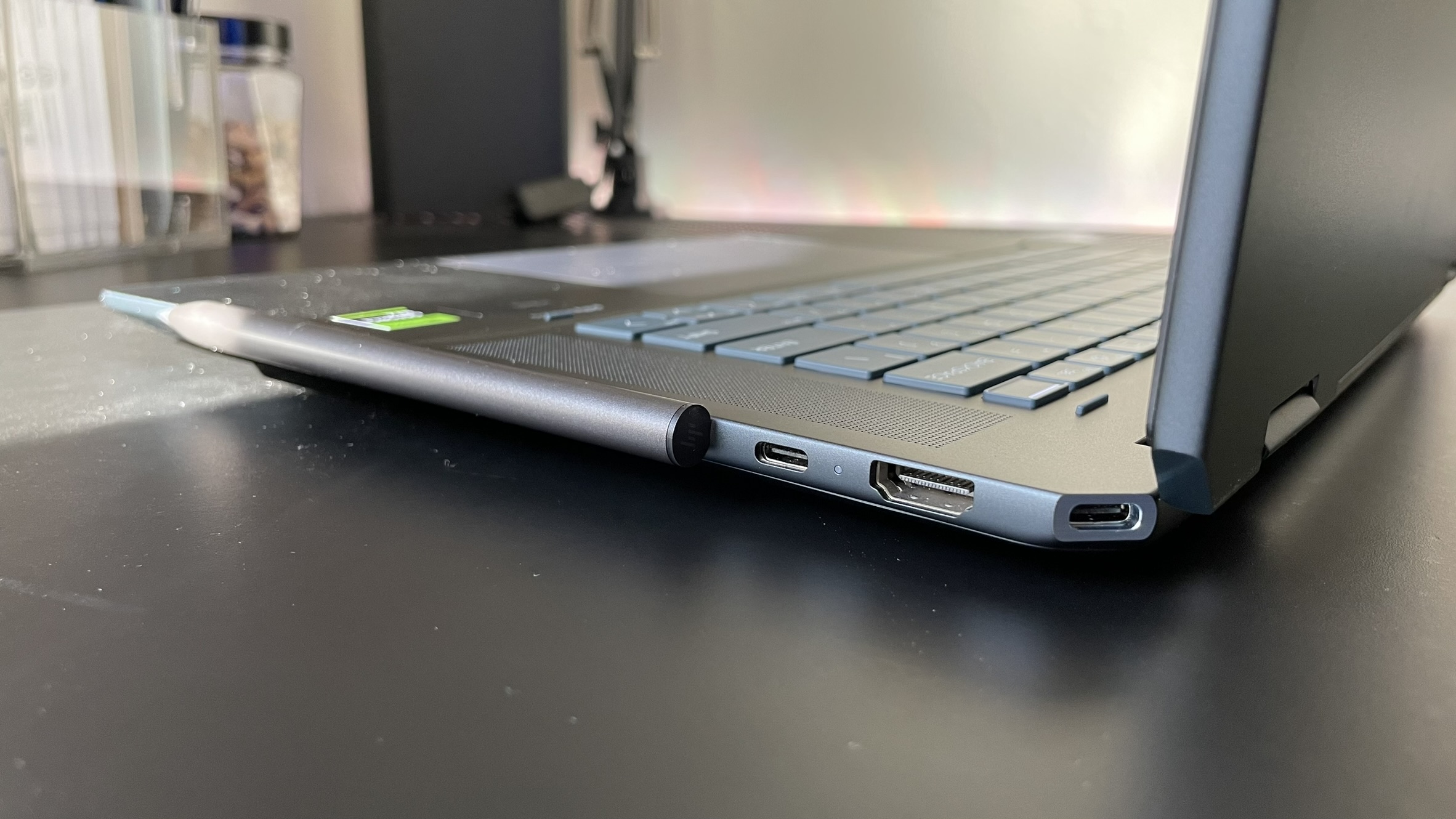
Specifications
Reasons to buy
Reasons to avoid
The HP Spectre x360 16 (2024) is packed with versatility. Its a fabulous multitasking buddy. It's OLED display makes colors pop. It's speakers can handle the bass of your favorite songs. If you feel like drawing, grab your stylus and flip the lid back — you now have a tablet.
✔️ You're willing to throw down some cash. It's expensive, but every penny you spend on this laptop's performance, battery life, vibrant display, great speakers, and good looks will be well-spent.
✔️ You value a well-designed laptop. The Spectre has rounded edges, a dual-hinged display, large keys and a roomy trackpad. It's neither ostentatious or bland.
✖️ You want more battery life. It squeaks by 11 hours, and while that's more than we recommend, there are plenty other laptops that last much longer.
✖️You need perfect color accuracy. The display is fine for the average user, but it doesn't cover the full DCI-P3 gamut. This could create issues for artists, designers, or video editors who routinely work with that color space.
Once in a while, we're blessed by the emergence of a 2-in-1 that crushes expectations in every conceivable manner. In this case, the HP Spectre x360 16 is not only the ultimate 16-inch 2-in-1 laptop, but it's the best of the year, period. It's pricey, but as our reviewer, Stevie Bonifield, said, "It's worth the price of admission."
This is thanks to the culmination of great battery life, a stunning OLED display, powerful speakers, a sleek design, a satisfying keyboard, and solid performance, thanks to the Intel Ultra 7 155H.
On the Laptop Mag battery test, which involves continuous web surfing over Wi-Fi at 150 nits, we saw the Spectre x360 last 11 hours and 7 minutes before running out of juice. That's about what we'd expect out of the average premium laptop, though a few hours shorter than the MSI Prestige 16 AI Evo (13:04) and the MacBook Air M3 (15:13).
Thanks to the power of OLED, you don't have much to worry about if you're a fan of a solid-looking display. It features a 2880 x 1800-pixel resolution touchscreen with OLED technology, meaning blacks are far deeper and inkier. On the colorimeter, the HP Spectre x360 covered 87.1% of the DCI-P3 color gamut, which is solid but not the best compared to competing laptops like the LG Gram Pro 16 2-in-1 (133.6%), MSI Prestige 16 AI EVO (137.9%), and Lenovo Yoga Pro 9i (105.7%).
However, OLED historically performs lower on DCI-P3 testing; anything with an 80% or higher DCI-P3 coverage is usually more than enough. Its brightness of 376 nits isn't super high, but that's unsurprising, considering OLED panels are typically a tad dimmer — and it's still brighter than the Prestige 16 (368 nits) and Yoga Pro 9i (373 nits).
Of course, its Intel Ultra 7 155H delivers excellent performance. On the Geekbench 6.1 overall performance test, the Spectre x360 managed a multi-core score of 12,592 That's stellar and absolutely crushes previous-generation chips, even pulling ahead of the MacBook M3 (12,087).
See our full HP Spectre x360 16 review.
Best for creators
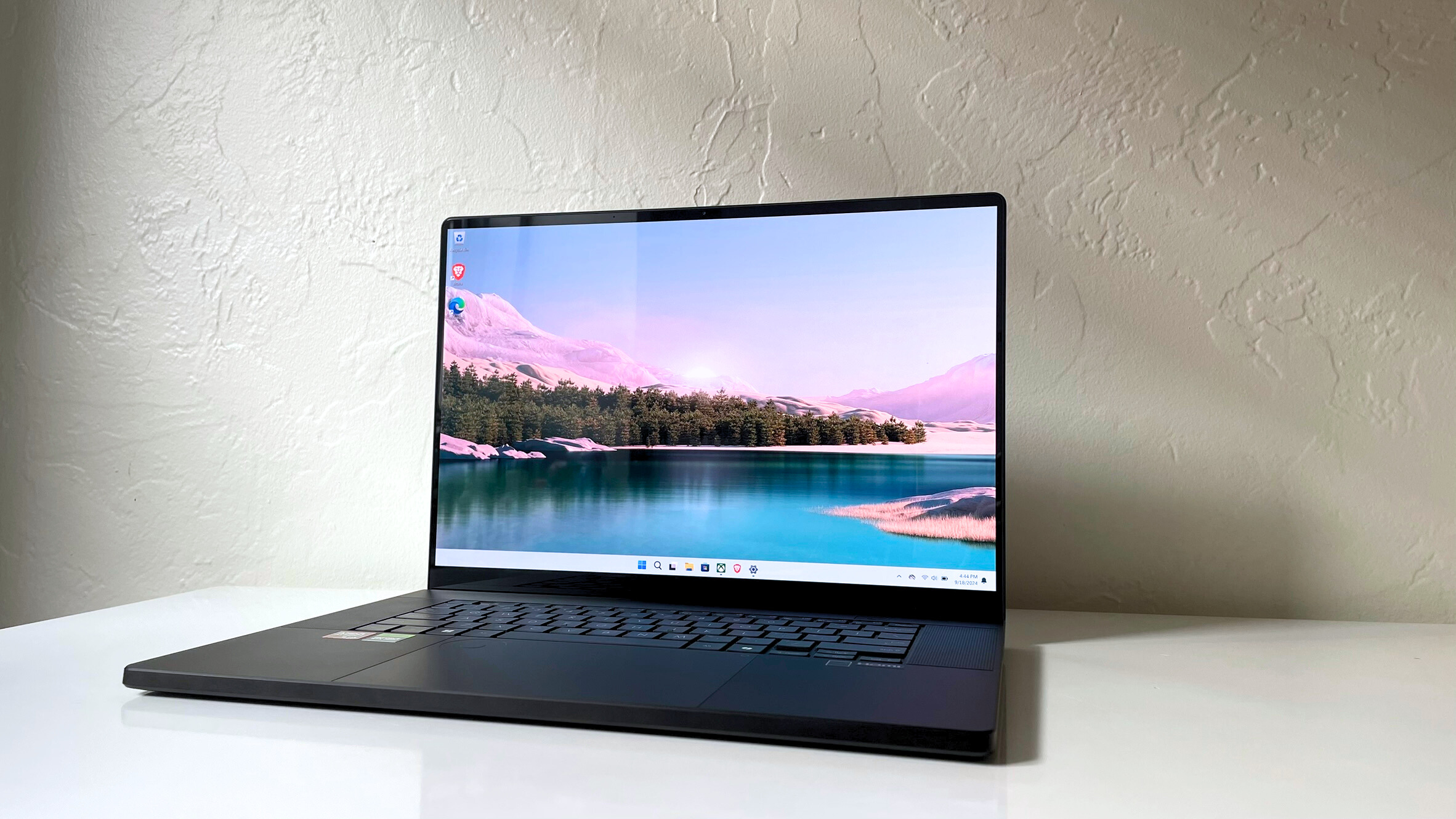
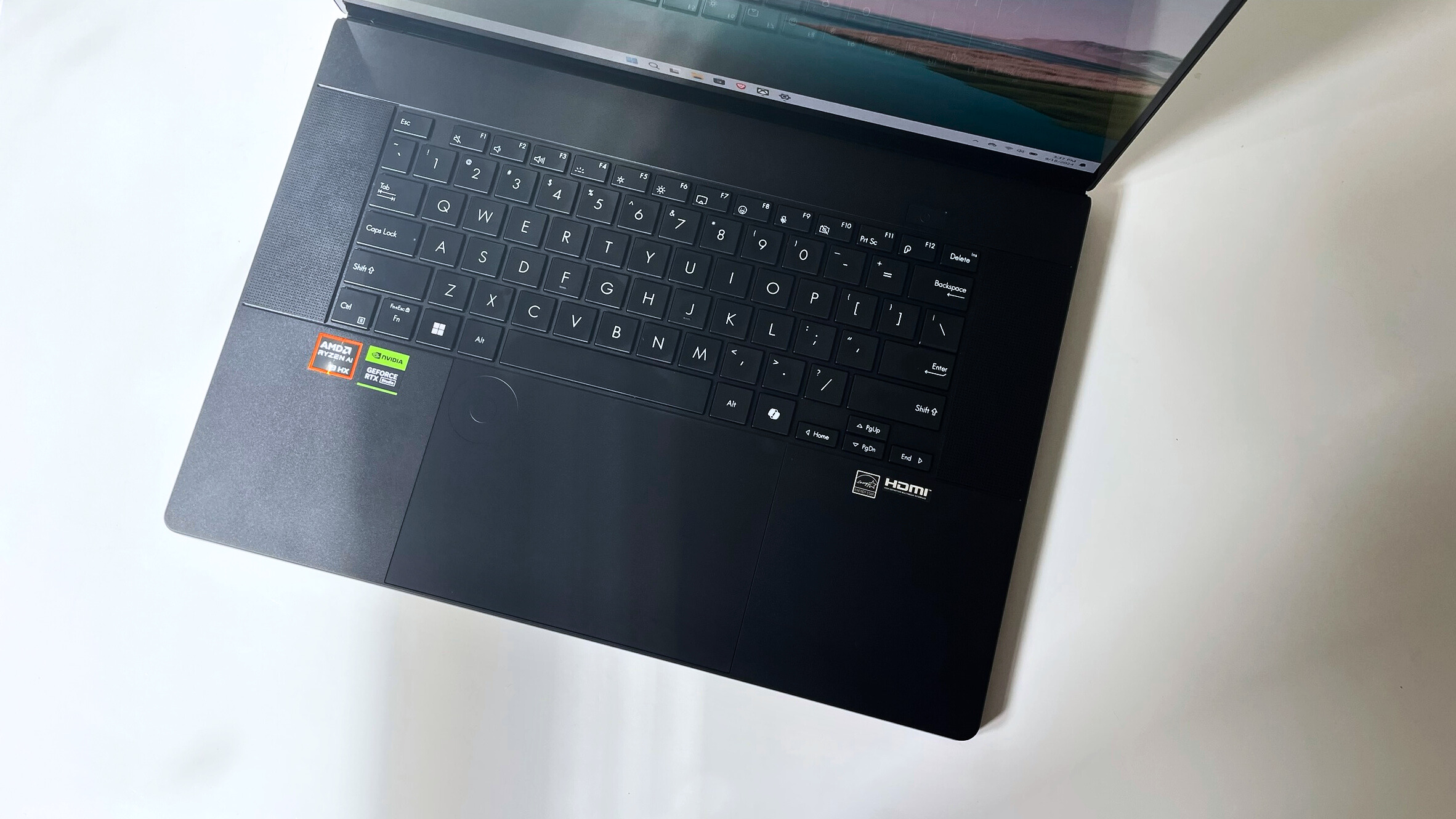
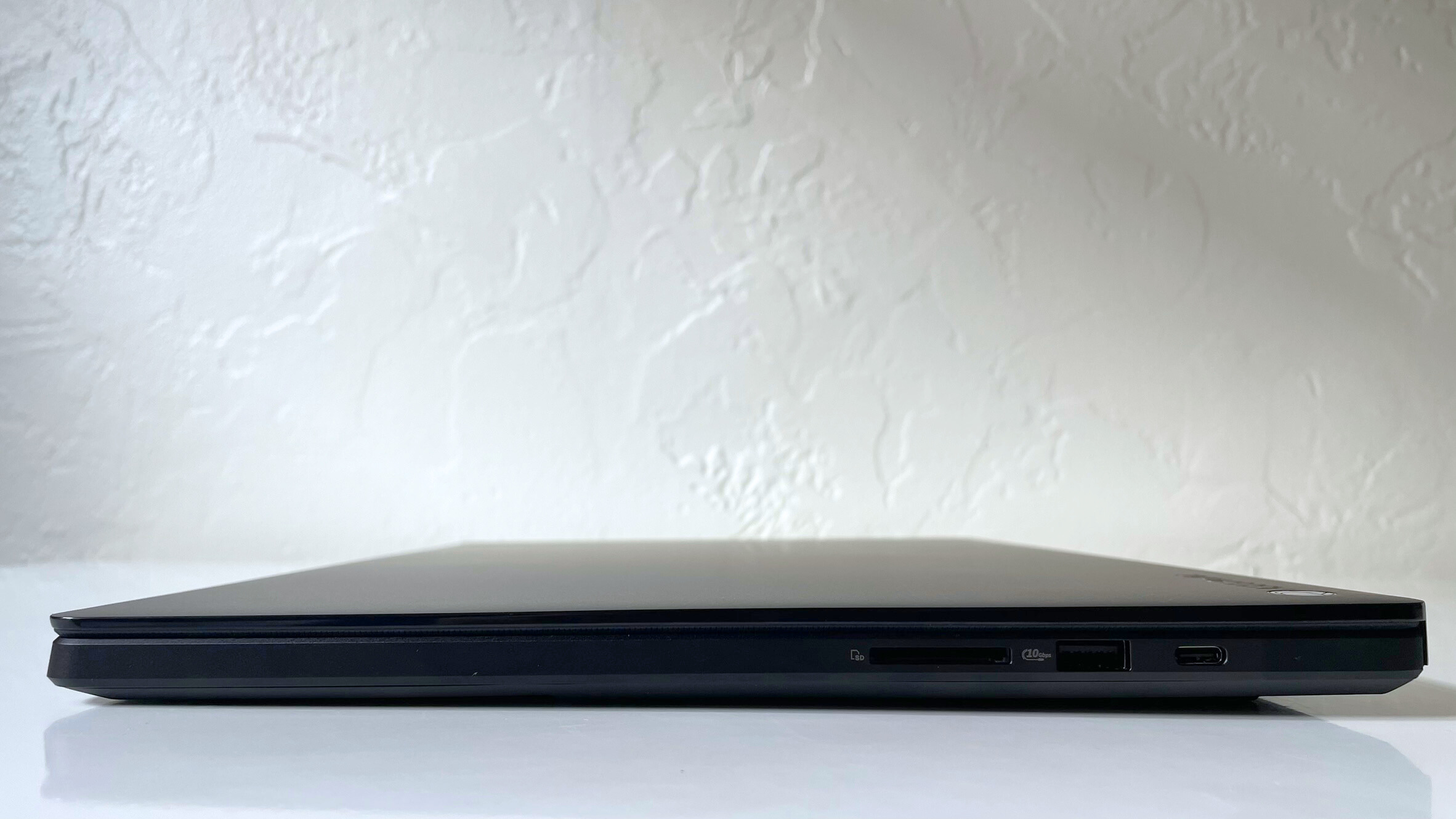
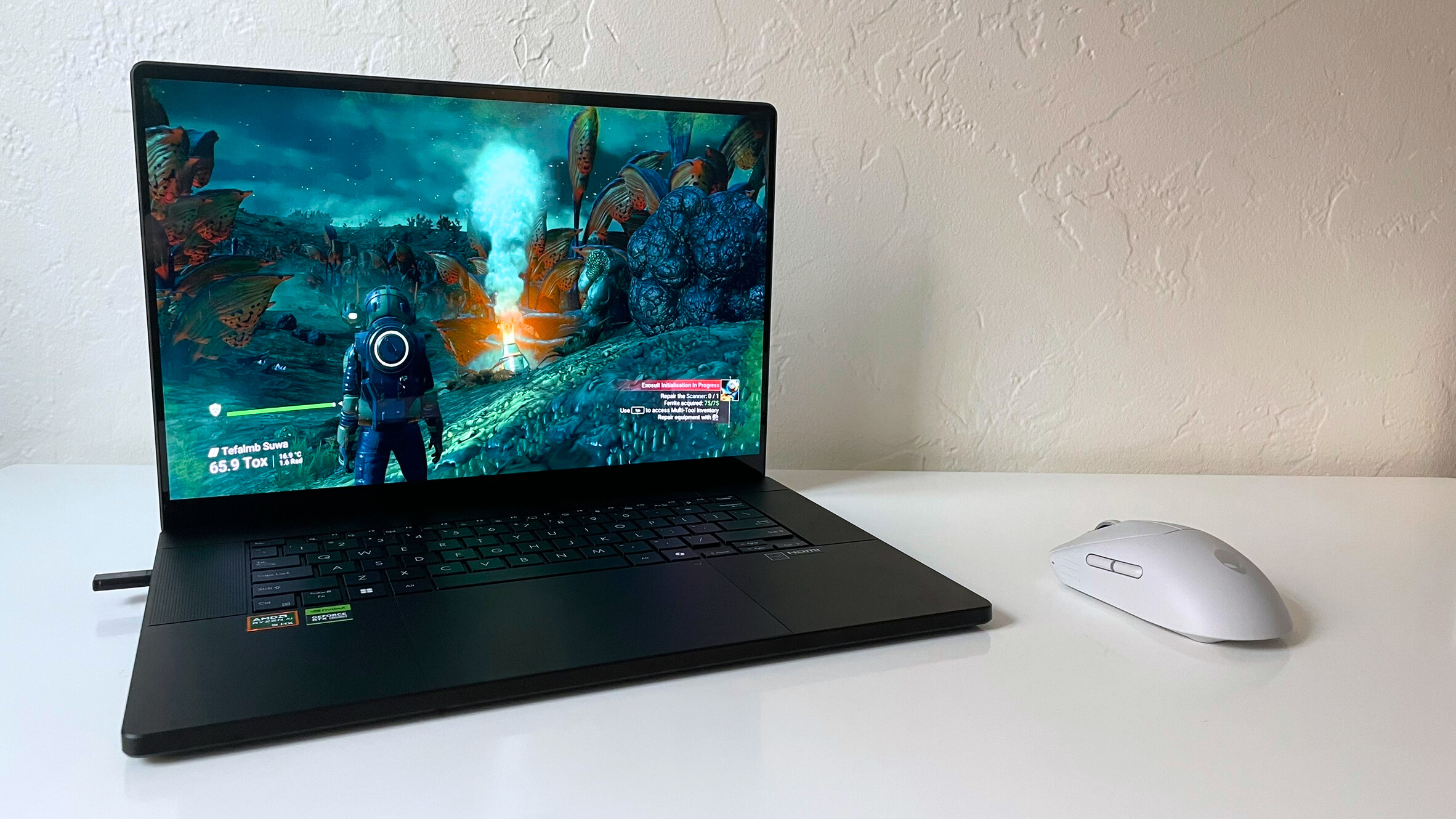
Specifications
Reasons to buy
Reasons to avoid
The Asus ProArt P16 offers nearly everything you'd expect out of a MacBook Pro — for $1,000 less.
✔️ You have the need for speed. Between multitasking, rendering, transcoding, and everything else you needed done yesterday, this laptop won't hinder your workflow.
✔️ You need color. Lots of colors. This laptop covers a large portion of the DCI-P3 color gamut, making is a good choice for video or photo editors.
✖️ The apps you need are only on macOS. Used to working in Final Cut Pro? Sorry, there isn't Windows version for that.
✖️ Long battery life is a necessity. The Asus ProArt P16 is a great laptop, but with under 10 hours of battery life, it's one major area where it cannot compete with the MacBook Pro.)
For the photographer, filmmaker, or graphic designer who is loyal to Windows, "The Asus ProArt P16 is a stellar example of what a creator laptop should be: powerful, reliable, and stylish," as our reviewer, Stevie Bonifield said. You don't have to pay MacBook Pro prices to get suburb performance in a thin and light chassis with a beautiful design that's just as easy on your eyes as it is on your wallet.
The ProArt's AMD Ryzen AI 9 HX 370, 32GB of RAM, and Nvidia RTX 4070 power it to a Geekbench 6 multicore score of 15,286, way beyond the average premium laptop. Compared to its Lenovo Yoga Pro 9i rival with an Intel Core Ultra 9 185H, it's 21 % faster (12,141), and it's 15% faster than the Samsung Galaxy Book 4 Ultra (13,061).
That stellar performance also played out in Laptop Mag's Handbreak benchmark, transcoding a 4K video to 1080p in 3 minutes and 15 seconds, much faster than the average premium laptop (7:58). It also outpaced the Galaxy Book 4 Ultra (4:52) and Yoga Pro 9i (3:53).
It also excelled in our 3DMark FireStrike synthetic graphics benchmark, scoring 24,284 — 29% higher than the Galaxy Book 4 Ultra (17,255) with an RTX 4070, and 12% higher than the Yoga Pro 9i (19,016) with an RTX 4050.
While I'd normally recommend a laptop with a wider color gamut for creatives, the ProArt P16 covers enough of the DCI-P3 gamut (85.5%) to be serviceable for most people. That said, it covers more than the MacBook Pro M3 Max (81.8%) and Galaxy Book 4 Ultra (81.8%), but much less than the Yoga Pro 9i (105.7%). It also has an SDR screen brightness of 356 nits, which is good, but the Yoga Pro 9i (737 nits) and Galaxy Book 4 Ultra (384 nits) get brighter.
The ProArt P16's battery life is a bigger letdown, though: 9 hours and 32 minutes. That's noticeably less than Galaxy Book 4 Ultra (13:15), way less than the MacBook Pro M3 Max (18:05), and just shy of the Yoga Pro 9i (9:51).
See our full Asus ProArt P16 review.
Best Ultrabook
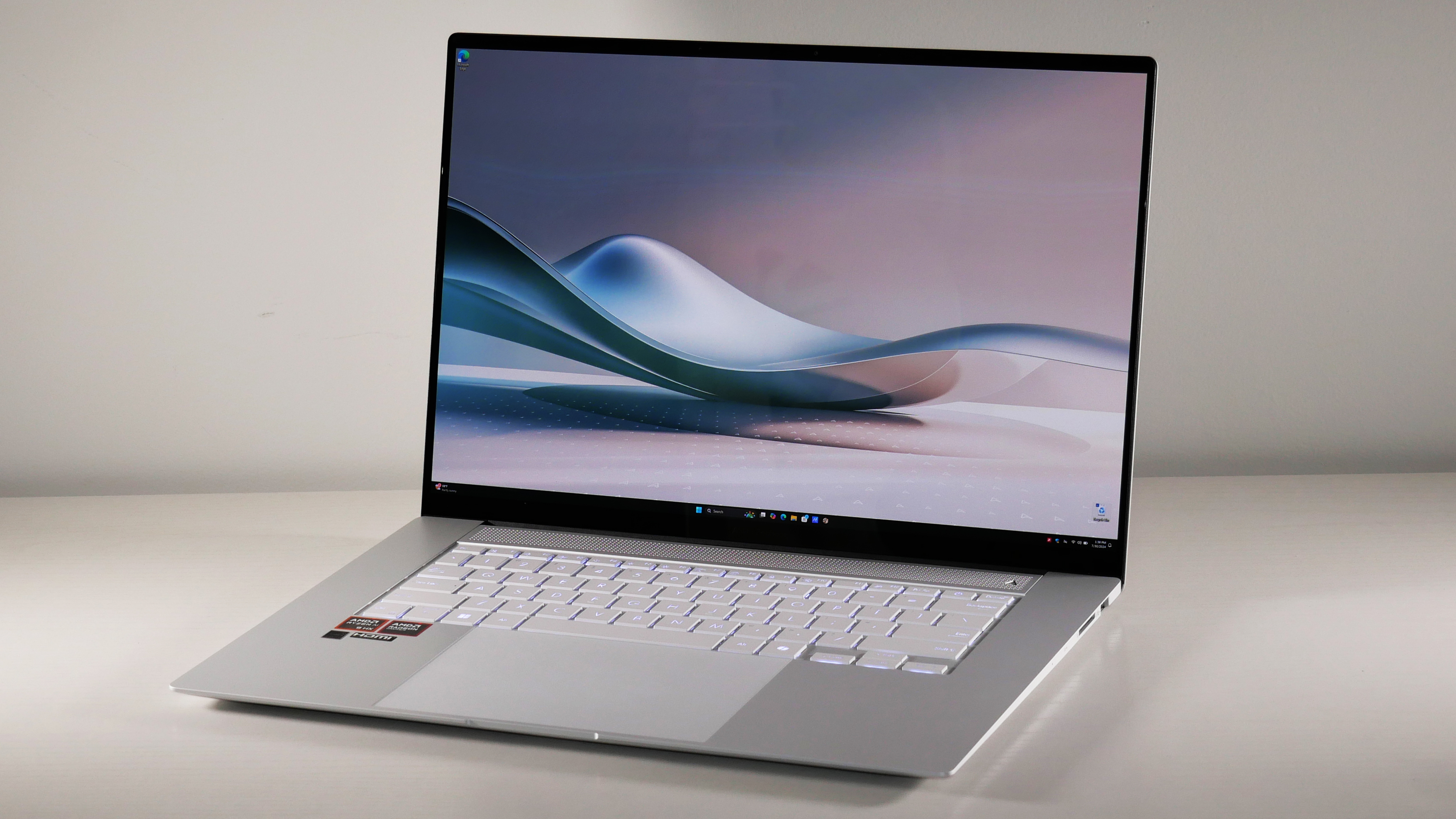
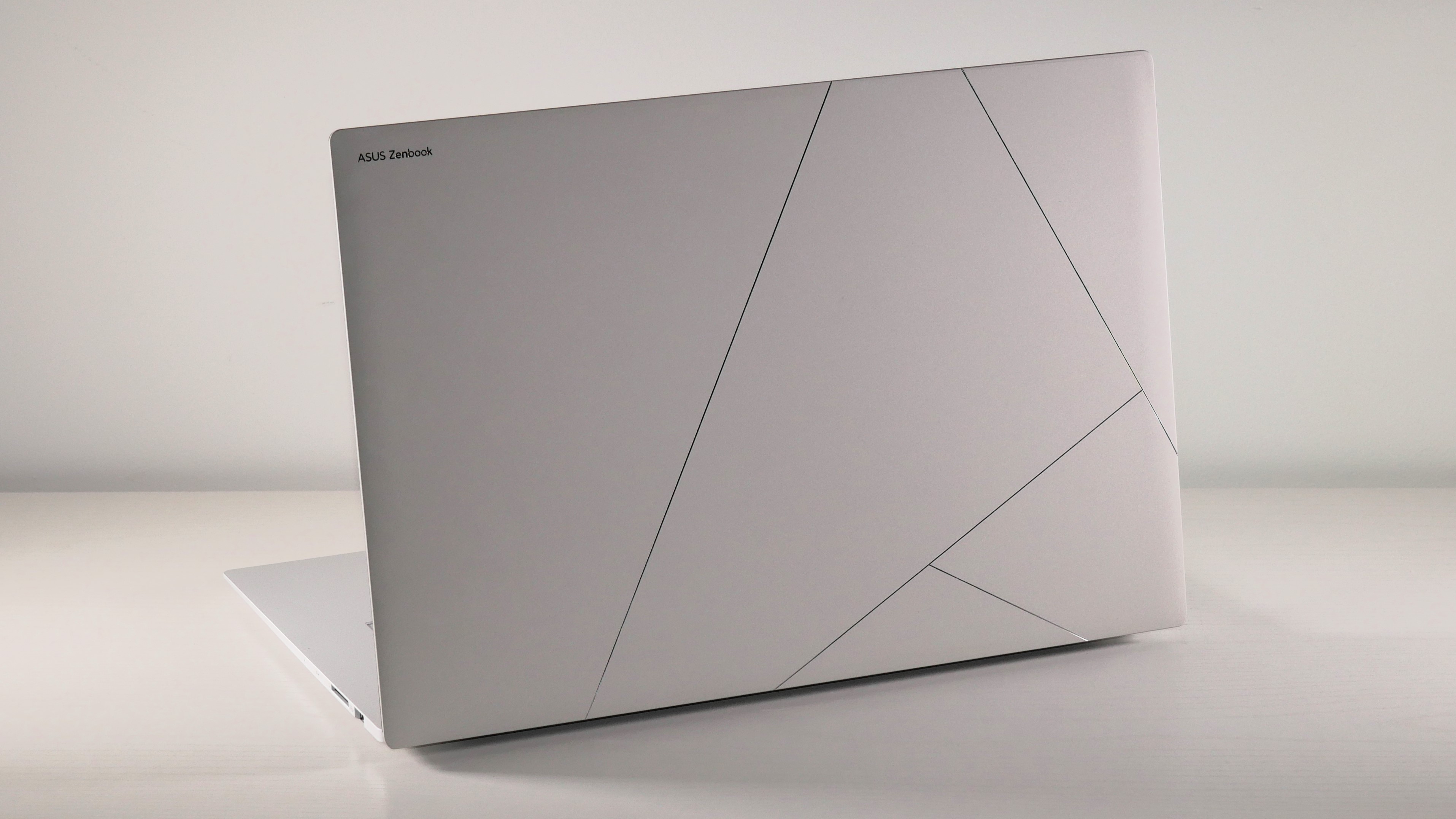
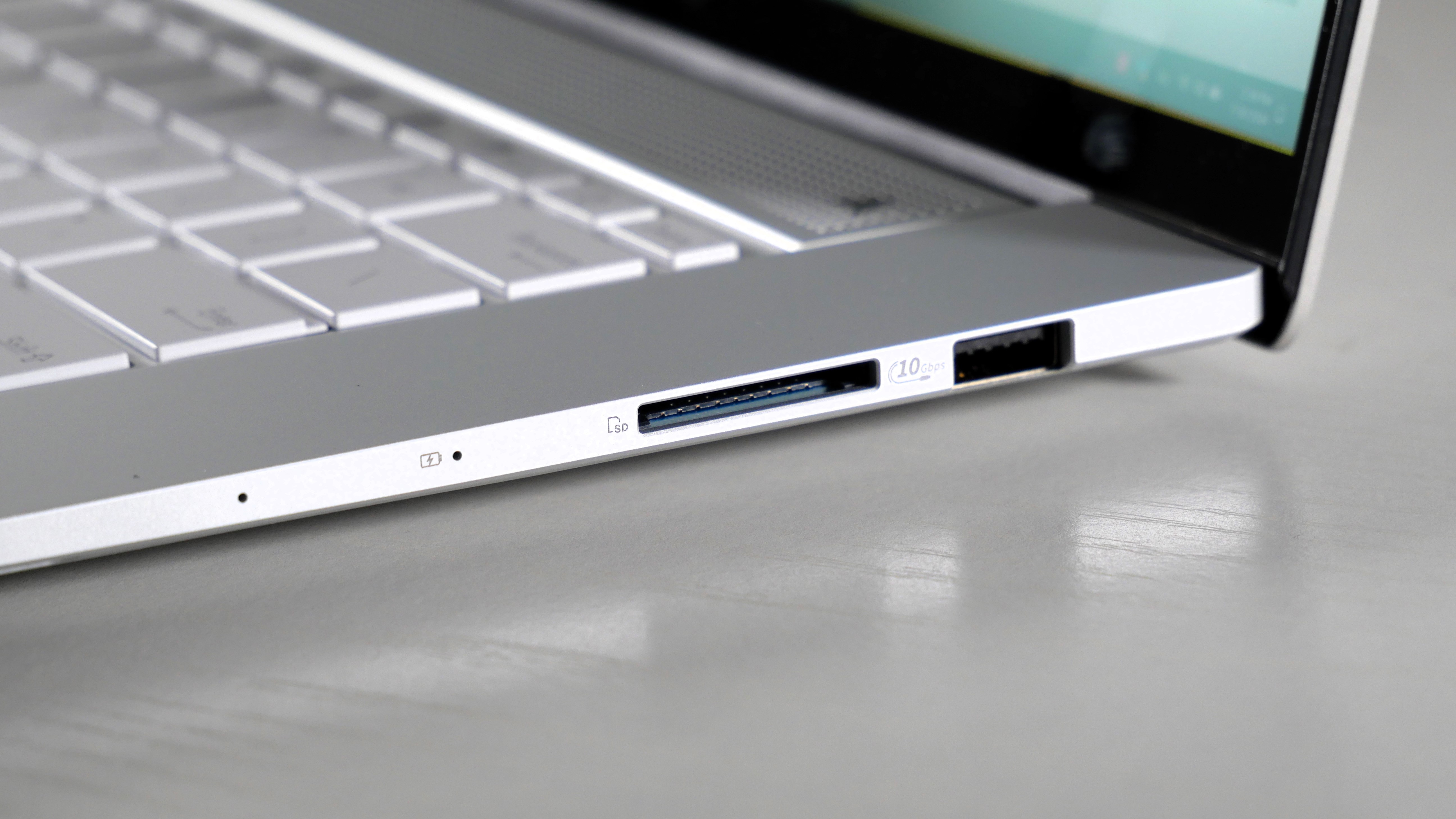
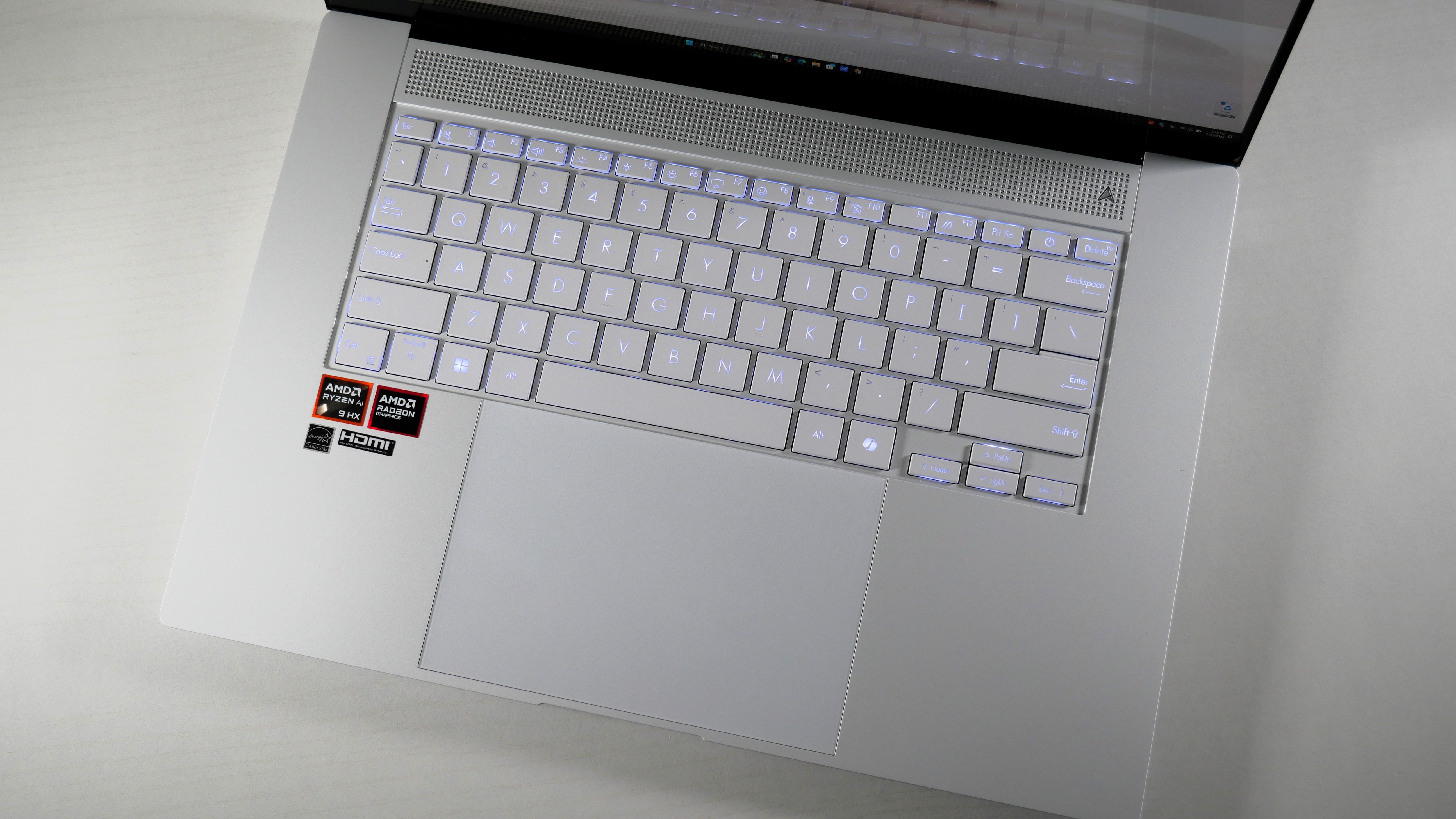
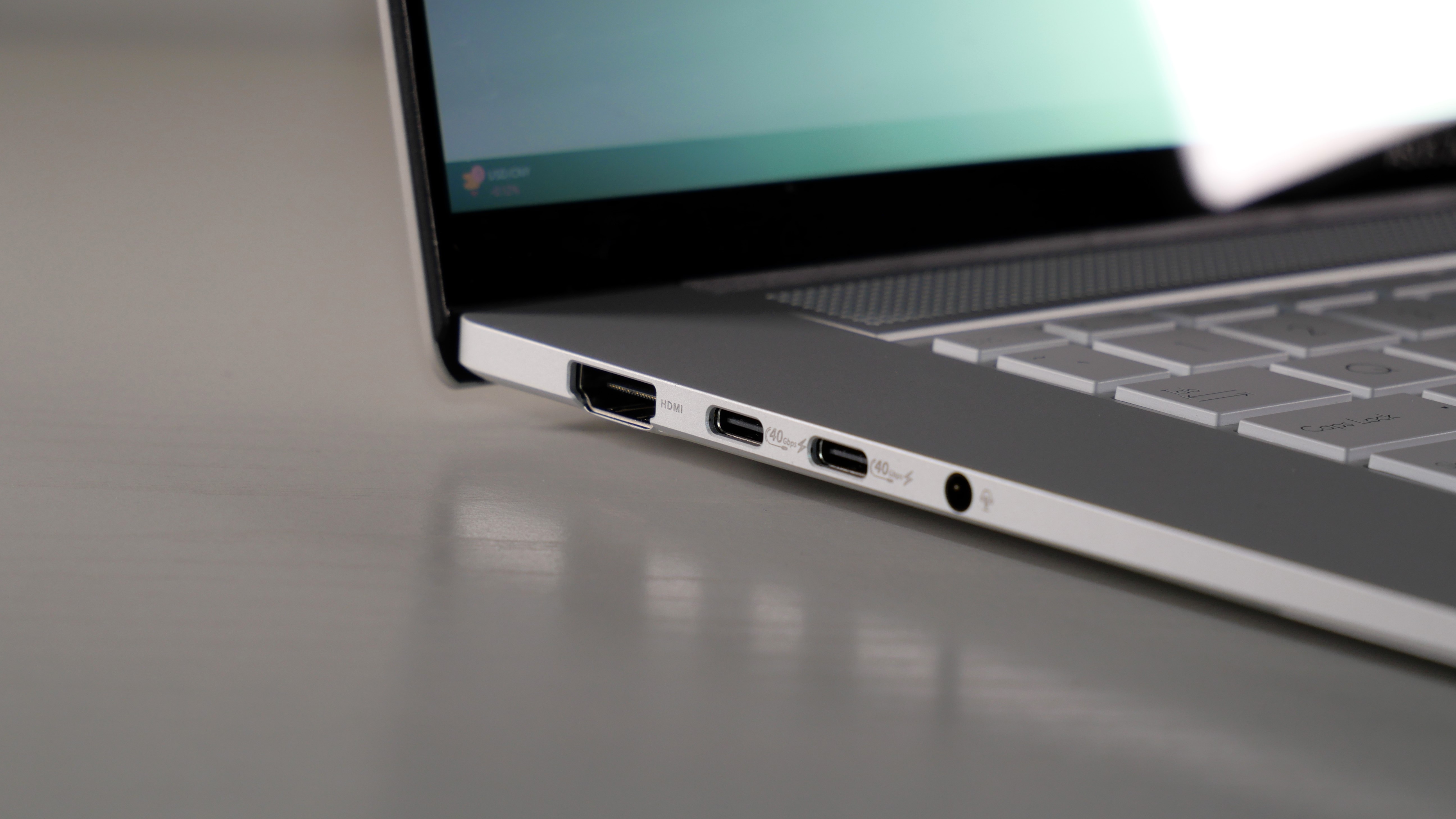
Specifications
Reasons to buy
Reasons to avoid
The Asus Zenbook S16 is powerhouse for anyone who needs a laptop to do a little bit of everything — without literally weighing them down.
✔️ You want a 16-inch laptop that doesn't feel like one. It's one of the thinnest we've ever reviewed and weighs just 3 pounds. For a large-screen laptop, its surprisingly compact!
✔️ You want a supercharged, productivity laptop. It's excellent at balancing day-to-day tasks and power-user features, like gaming or 3D rendering.
✖️ You won't compromise on battery life. It doesn't have the shortest battery life out of the the laptops on this list, but we wish it lasted longer than it does.
✖️ You want to game with it on your lap. It got a little warm under normal workloads, so we expect playing games would raise its surface temperature into uncomfortable territory.
Where the Asus Zenbook S14 is our best 14-inch Ultrabook, the Zenbook S16 is our best 16-inch pick. It's damn good-looking laptop with some of the best gaming performance we've seen on an integrated graphics chip alone. It impressed our editor, Rami Tabari, right from the start with its "excellent performance [...] packed into a one-of-a-kind chassis." Having also reviewed this laptop myself, before I started writing for Laptop Mag, I wholeheartedly agree (especially about the Star Trek-esque logo).
At 0.47 ~ 0.51 inches thick and weighing 3.3 pounds, it's nearly as light and thin as the MacBook Air but more eye-catching. The ceramic-oxide layer over the aluminum chassis gives the laptop a pleasant look and feel, and the thin display bezels make it look polished and refined. It's easy to forget this is a 16-inch laptop!
The Zenbook S16 has the power to match its charm, too. On the Geekbench 6.3 multicore performance test, it scored 13,282, flying past the average premium laptop average of 10,435 (22% faster) and the Asus Zenbook S 14 with an Intel Core Ultra 7 258V by 16% (11,157). It even outpaces the MacBook Air M3 by 10% (12,052). Compared to our previous best Ultrabook pick, the MSI Prestige 16 AI Evo, it's on par.
Gaming is where this laptop really shines — especially without a discrete graphics card. On the Sid Meier's Civilization VI: Gathering Storm benchmark (Medium, 1080p), the Zenbook S16 averaged 63 fps, whereas its Zenbook S14 sibling averaged only 48 fps. It also scored well against the Asus Vivobook S15 with a Qualcomm Snapdragon X Elite X1E-78-100 (21 fps).
In more graphicly intensive games, like Far Cry 6 and Shadow of the Tomb Raider, it does hit or come close to our 30 fps minimum. But to increase that number to 60 fps or higher, you will need to turn down the graphics settings and possibly take advantage of AMD FSR. With the resolution set to 1080p and FSR set to ultra performance, I personally was able to average 77 fps in Cyberpunk 2077 on the Zenbook S16.
Battery life is this laptop's main weak point, unfortunately — just 11 hours and 35 minutes. That's not much longer than the average premium laptop and definitely not as long as the MacBook Air (15:03). It's also 2 hours shorter than the Zenbook S14 (13:51) and MSI Prestige 16 AI Evo (13:04).
See our full Asus Zenbook S16 review.
Benchmark comparisons
Click to view chart data in table format
| Row 0 - Cell 0 | MSI Prestige 16 AI Evo | Apple MacBook Pro 16 M4 Pro | Asus ROG Zephyrus G16 | HP Spectre x360 16 | Asus ProArt P16 | Asus Zenbook S16 | Acer Swift Go 16 |
Geekbench 6 (Higher is better) | 13,310 | 22,822 | 15,408 | 12,592 | 15,286 | 13,282 | 13,088 |
Handbrake time ((MM.SS), lower is better) | 5.17 | 2.00 | 3.08 | Not tested | 3.15 | 5.08 | 4.51 |
Battery life - Web surfing (HH.MM) | 14.06 | 20.46 | 9.14 | 11.07 | 9.32 | 11.35 | 10.35 |
SSD transfer speeds (MBps, higher is better) | 1400 | 6640.5 | 1233 | 1805.49 | Not tested | 908 | 1468 |
DCI-P3 Color Gamut (Higher is better) | 137 | 81.4 | 82.1 | 87.1 | 85.5 | 79.7 | 86 |
Display Brightness (Nits, higher is better) | 368.2 | 565 | 388 | 376 | 356 | 458 | 332 |
Hottest temperature (95 degree comfort threshold) | 98.5 | 90.5 | 131 | 99.3 | 87.6 | 106 | 90 |
Recently reviewed
Not every laptop can make the best 16-inch laptops page. (We wouldn't be doing you that much good if that were the case!) We review new laptops every week and over 100 laptops yearly, so here's a look at our most recently reviewed laptops that didn't make this page either due to a fault, battery life, performance, or something else.
Acer Predator Helios 16 | Intel Core i9-14900HX | Nvidia GeForce RTX 4080 | 32GB RAM | 2TB SSD
Score: ★★★★
Pros: Bright and colorful display; powerful RTX 4080 performance; superb processing power; excellently priced
Cons: Weak speakers; lacking battery life
See our full Asus ROG Zephyrus G16 review.
Acer Predator Helios Neo 16 | Intel Core i9-14900HX | Nvidia RTX 4060 | 16GB RAM | 1TB SSD
Score: ★★★★
Pros: Leading productivity power; solid RTX 4060 fps; bright and colorful panel; sturdy chassis; tons of ports
Cons: Piercing speakers; sluggish trackpad; dreadful battery
See our full Acer Predator Helios Neo 16 review.
Acer Predator Triton Neo 16 | Intel Core Ultra 9 185H | Nvidia GeForce RTX 4060 | 32GB RAM | 1TB SSD
Score: ★★★★
Pros: Slick general performance; smooth RTX 4060 graphics; bright 240Hz display; decent battery life; plenty of ports; quality webcam
Cons: Keyboard gets very hot while gaming; thermal throttles during long gaming sessions; tinny, distorted audio
See our full Acer Predator Triton Neo 16 review.
Alienware x16 R2 | Intel Core Ultra 9 185H | Nvidia RTX 4080 | 32GB RAM | 1TB SSD
Score: ★★★★
Pros: Impressively thin design; excellent keyboard & touchpad; strong performance and graphics; solid battery life; great thermals
Cons: Price-to-performance ratio is rough; display isn’t the best for a $3K+ gaming laptop; messy audio
See our full Alienware x16 R2 review.
Dell G16 | Intel Core i7-1365HX | Nvidia RTX 4060 | 16GB RAM | 1TB SSD
Score: ★★★★½
Pros: Gorgeous display; phenomenal keyboard experience; powerful performance; decent battery life; reasonably priced
Cons: Tiny touchpad; hollow speakers
See our full Dell G16 review.
Lenovo Legion 5i 16 Gen 9 | Intel Core i9-14900HX | Nvidia GeForce RTX 4060 | 32GB RAM | 1TB SSD
Score: ★★★★½
Pros: Impressive general performance; dependable RTX 4060 graphics; clicky, satisfying keyboard; loud, if slightly tinny audio; plenty of ports; strong sRGB display vibrance
Cons: Battery life is poor, even when web surfing; boring, flat Luna Grey colorway
See our full Lenovo Legion 5i 16 Gen 9 review.
Lenovo Yoga Pro 9i 16 Gen 9 | Intel Core Ultra 9 185H | Nvidia RTX 4050 | 32GB RAM | 1TB SSD
Score: ★★★★½
Pros: Beautiful display; bouncy keyboard; strong overall performance; discrete graphics; decent battery life
Cons: Can’t configure RTX 4060 with Intel Core Ultra 7; touchpad too resistant; awful audio
See our full Lenovo Yoga Pro 9i 16 Gen 9 review.
LG Gram Pro 16 2-in-1 | Intel Core Ultra 7 155H | Intel Arc | 32GB RAM | 1TB SSD
Score: ★★★★
Pros: Thin and light 2-in-1 design; vibrant 16-inch OLED screen; almost 11 hours of battery life; solid productivity performance
Cons: Expensive relative to performance; mushy trackpad
MSI Vector 16 HX | Intel i9-14900HX | Nvidia RTX 4080 | 32GB RAM | 1TB SSD
Score: ★★★★½
Pros: Superb processing power; high RTX 4080 fps; beautiful display; decent battery life; solid audio
Cons: Flimsy trackpad; loud fans; SSD could be faster
See our full MSI Vector 16 HX A14VHG review.
Razer Blade 16 | Intel Core i9-14900HX | Nvidia RTX 4090 | 32GB RAM | 2TB SSD
Score: ★★★★½
Pros: Powerful, reliable performance; vivid OLED display; loud, powerful speakers; comfortable, snappy keyboard
Cons: Expensive base configurations; lower battery life than the previous generation
See our full Razer Blade 16 review.
Samsung Galaxy Book 4 Ultra | Intel Core Ultra 9 185H | Nvidia RTX 4080 | 32GB RAM | 1TB SSD
Score: ★★★★½
Pros: Gorgeous 120Hz AMOLED display; powerful CPU and GPU combo; excellent battery life; relatively thin and light; robust Samsung ecosystem
Cons: Performance doesn’t quite match top competitors; retail pricing high for max configuration; webcam could be better in low-light
See our full Samsung Galaxy Book 4 Ultra review.
How to choose the best 16-inch laptop for you
What makes a 16-inch laptop good is not much different than what makes any other laptop good. You need to question if the price being asked of you is worth what it can offer, and there are many factors that determine whether or not that is the case. Battery life, performance metrics, display color depth and brightness, thermal efficiency, aesthetic, sturdiness, and unique gimmicks all funnel into what makes a laptop worth the purchase.
The MSI Prestige 16 AI Evo balances each of these elements, offering great performance metrics in an ultra-light weight frame. If you're looking for a great overall 16-inch laptop, this is an excellent pick.
But if "breaking the bank" is your motto, take a look at the MacBook Pro 16-inch (M4 Pro). With nearly 21 hours of battery life and cry-worry performance, you'd think this is the laptop of dreams. That is until you see its price tag. If you're somehow still considering buying this thing, I commend your resolve.
The Asus ROG Zephyrus G16 and Asus ProArt P16 could also "break the bank," though they are much cheaper than the MacBook Pro 16 M4 Pro. The former is a gaming laptop, while the latter is an intense workstation. Both feature incredible specs and can run guns at high framerates.
The HP Spectre x360 16 is another great 2-in-1 laptop with a stunning visual design and amazing internal specs, although we found it was a little bit heavy to make tablet mode comfortable. But with a stunning OLED display, long-lasting battery life, phenomenal speaker system and all-around solid performance, it's hard not to appreciate this thing.
If you're in need of something less expensive that still offers solid performance, there's the Acer Swift Go 16. You won't get anything as impressive at the more expensive alternatives, but at the very least, you can expect snappy multitasking and decent battery life.
FAQs
Q: What is a Copilot+ PC?
A: Microsoft has specific requirements as to what it considers a Copilot+ PC. One of those requirements is that a laptop's processor must have an NPU capable of reaching at least 40 TOPS to run more advanced Windows AI features like Recall, Automatic super resolution, and Live Captions.
Copilot+ PCs have a Qualcomm Snapdragon X Elite or Plus, an Intel Core Ultra 200V series, or AMD Ryzen AI 300 series processor. However, the advanced AI features are currently only available on Snapdragon laptops. A free update for Intel and AMD laptops area continuing to roll out through early 2025.
Q: Do I need a laptop with a discrete GPU for creative work?
A. Not necessarily! In general, photo, video editing, and similar workloads lean heavily on the processor, so regardless if you get a MacBook, Windows, or Windows on ARM laptop, you'll be in fine shape.
MacBooks have been the de-facto machine for creative, visual work for a long time. (My fiancé, who is a professional graphic designer, won't use any thing else.) But Qualcomm's Snapdragon X Elite chips can process the same, common design tasks just as efficiently.
Q: How much RAM do I need for gaming or creative work?
It depends! With a discrete GPU (which has its own on-board video RAM) and Hardware Acceleration, you can get away with at least 16GB if you're not working on anything resource-intensive. (16GB is also the bare minimum I recommend for gaming.) But if you're a professional creative, we recommend a minimum of 24GB — though if you have the budget for 32GB or more, that would be ideal.
If the graphic design laptop you have your eye on has unified memory (RAM that is built into the CPU itself), you probably want to configure it with at least 32GB of RAM. The RAM in these laptops is shared between the CPU and integrated graphics; if you don't have enough total RAM, then the integrated graphics might not have enough resources to load or convert large design files.
Q: What graphics card do I need in a gaming laptop?
It depends! If you want high frame rates and stunning graphics, then an RTX 4080 or RTX 4090 are your best bet. Those graphics cards make the most out of high refresh rate, OLED displays. If you are willing to compromise on one or the other, look for gaming laptops with either an RTX 4070, 4060, or 4050.
However, an RTX 4070 gaming laptop usually provides the best balance between frame rate and great graphics. Some are pricier than others, so do shop around to find something that fits your budget.
Q: I already have a stylus; will it work with one of these laptops if it has a touchscreen?
A. That depends! Not all touchscreens have stylus support. The ones that do might not support the same type of pens. We recommend checking the manufacture's website of both the laptop and stylus to be absolutely sure.
This will help you determine what pen protocols the stylus and laptop support. The two main ones are Microsoft Pen Protocol (MPP) and Wacom AES. They're not intercompatible, but some pens support both, while others only support one.
How we test the best 16-inch laptops
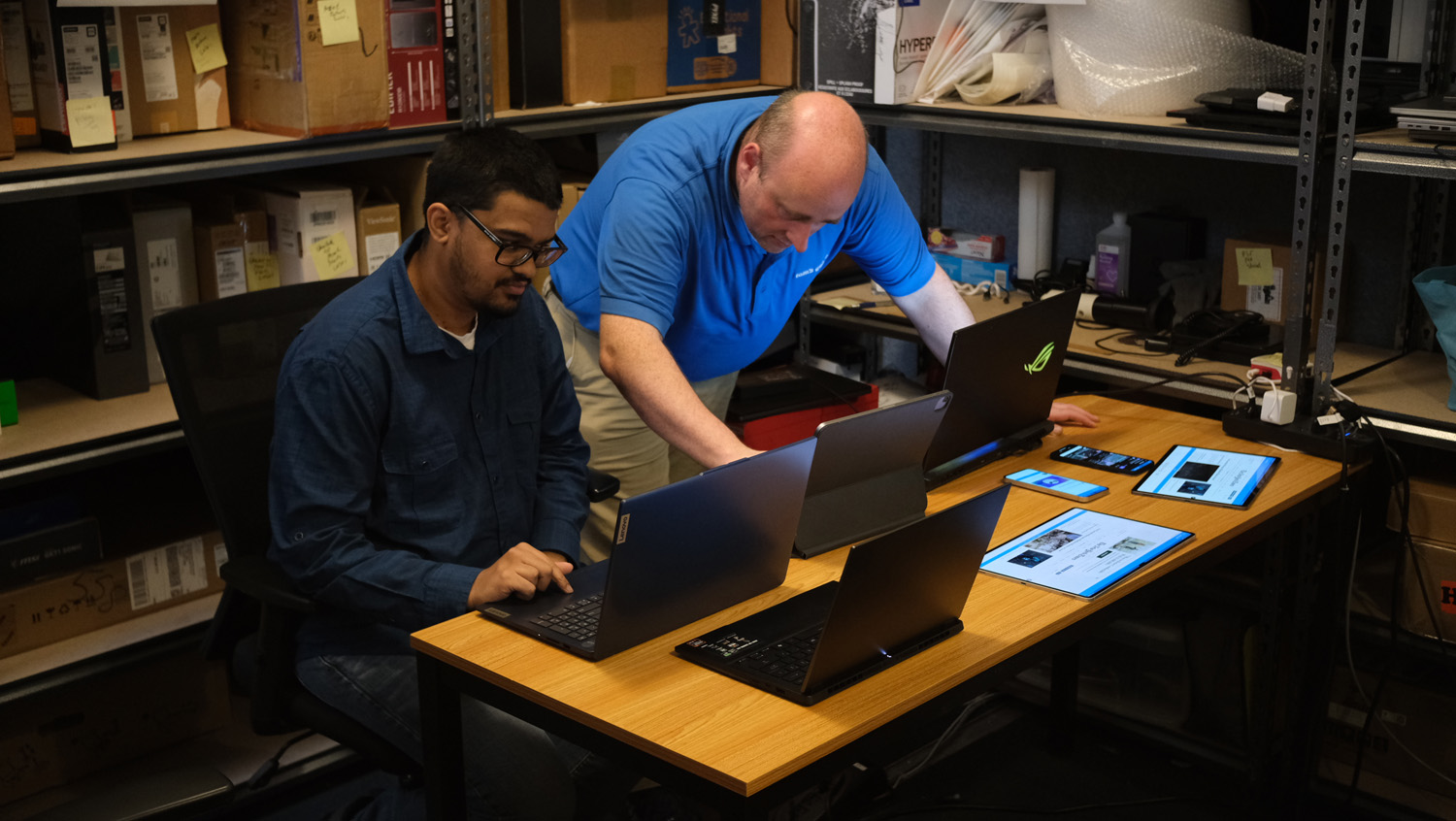
We put each laptop through extensive benchmark testing — both synthetic and real-world — before they end up in the hands of our reviewers. We evaluate each aspect of the laptop, including its performance, battery life, display, speakers, and heat management.
In our benchmark testing, we use a Klein K10 colorimeter to detect the brightness and DCI-P3 color gamut of the laptop's display. For performance testing, we run the laptop through a gauntlet of benchmarks, including Geekbench 6 and 3DMark professional graphics tests.
To determine real-world performance, we convert a 4K video to 1080p resolution and duplicate a 25GB file. Our real-world graphics test is Cid Meier's Civilization V: Gathering Storm benchmark at 1080p resolution and Medium graphics. We also run heat tests by playing a 15-minute full-screen video and measuring temperatures in different areas of the laptop.
For our battery test, we continuously web surfing over WiFi at 150 nits of brightness. For MacBooks and premium Windows 11 laptops, a runtime of over 10 hours is considered a good result, whereas gaming laptops and workstations that can stay powered longer than 5 hours deserve praise.
Following these tests, the laptop is given to our expert reviewers for extensive hands-on testing. Our reviewers will spend days using the laptop as part of their typical workflow to get a sense of the real-world performance and live with the laptop to come away with a thorough understanding of the hardware and software experience. This blended lab testing and hands-on approach allows us to offer you a clear and comprehensive view of every laptop that comes through Laptop Mag.
See this page on How We Test Laptops for more details on our benchmarking procedures.
Why trust Laptop Mag
Laptop Mag reviews over one hundred different laptops every year, from paperweight ultralights to everyday workhorses to lumbering gaming notebooks that scorch the frame rates of even the hottest AAA games. We're not just experts in the laptop field, as we go one step further by meticulously testing smartphones, tablets, headphones, PC accessories, software, and even the latest in gaming.
We are 100% independent and have decades of experience to help you buy with confidence. In fact, Laptop Mag has been testing and reviewing products for three decades, and we continue to deliver trustworthy reviews you can rely on.
Our experienced team of writers and editors scour the available information about the laptop and put it through its paces to determine which is best for you. But before they start, the testing team subjects each system to a rigorous regimen of synthetic and real-world tests to see how a system handles the type of work and games you’re most likely to throw at it.
Our editorial trustworthiness is enforced by one of the world's largest technology publishers, Future Publishing. As a company, we have unrivaled experience across every tech sector — and we're the group's specialist for all things mobile tech.
Sign up to receive The Snapshot, a free special dispatch from Laptop Mag, in your inbox.

Joanna Nelius is a contributing writer to Laptop Mag. She has reported on and reviewed laptops for The Verge, Gizmodo, PC Gamer, and USA Today.
